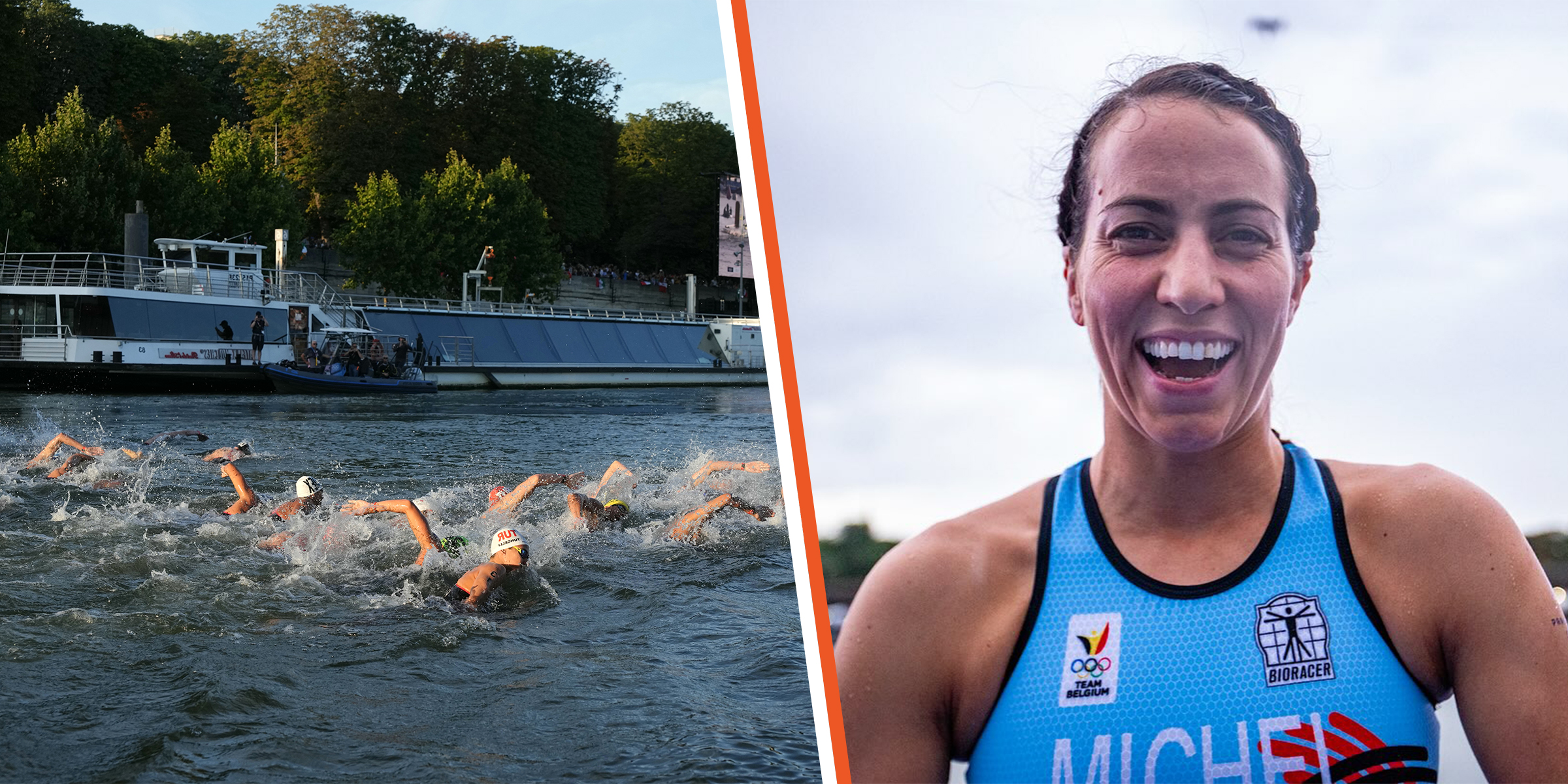
7 Swimmers Fell Ill After Competing at the 2024 Olympics — Here's Why
- Seven athletes, including gold medalists, fell ill after swimming in the Seine River during the Paris 2024 Olympics.
- Despite cleanup efforts, the river's safety was questioned as the athletes experienced symptoms like vomiting and diarrhea.
- Experts have weighed in on potential causes of the illnesses, challenging the effectiveness of public health safety measures.
During the 2024 Olympics in Paris, while athletes shattered world records and claimed their medals, an unexpected challenge emerged outside the competition. After taking a dip in the Seine River, seven athletes fell ill, raising concerns about water quality.
Despite centuries of the Seine being a dumping site, significant resources and effort were dedicated to cleaning it before the Games. Nonetheless, experts and online users quickly noted that the river was still unclean.
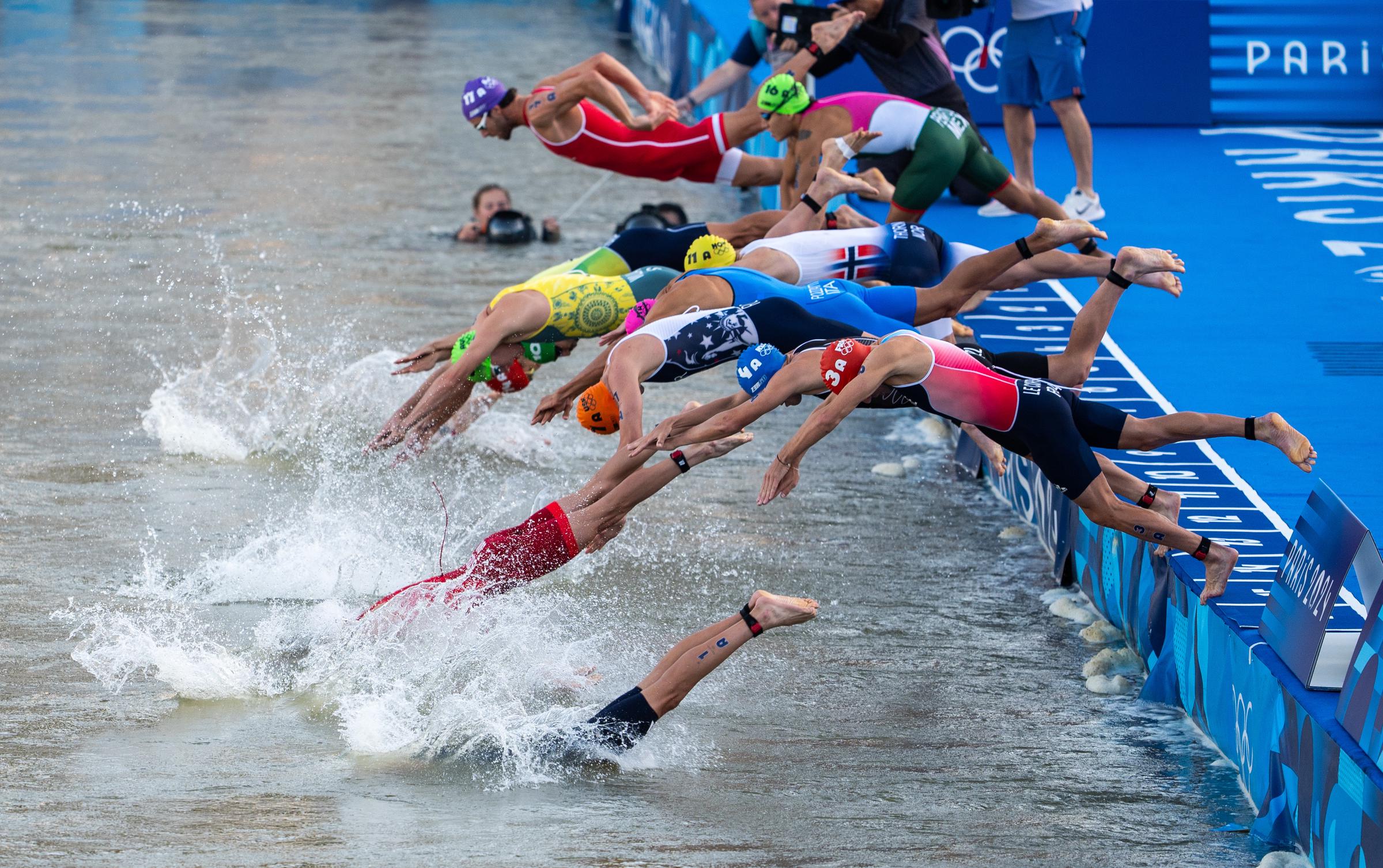
Athletes dive into the Seine River to compete in the Mixed Relay at the 2024 Olympic Games in Paris, France, on August 5, 2024 | Source: Getty Images
Daniel Wiffen
Daniel Wiffen is one of the swimmers who competed in the Seine River and won a gold medal. On July 30, 2024, the swimmer from Ireland made a splash in the 800m freestyle, holding off a fierce late charge from American Bobby Finke to secure victory.
Wiffen set an Olympic record and clinched Ireland's first gold medal of the 2024 Games, with Italy's Gregorio Paltrinieri finishing in third.
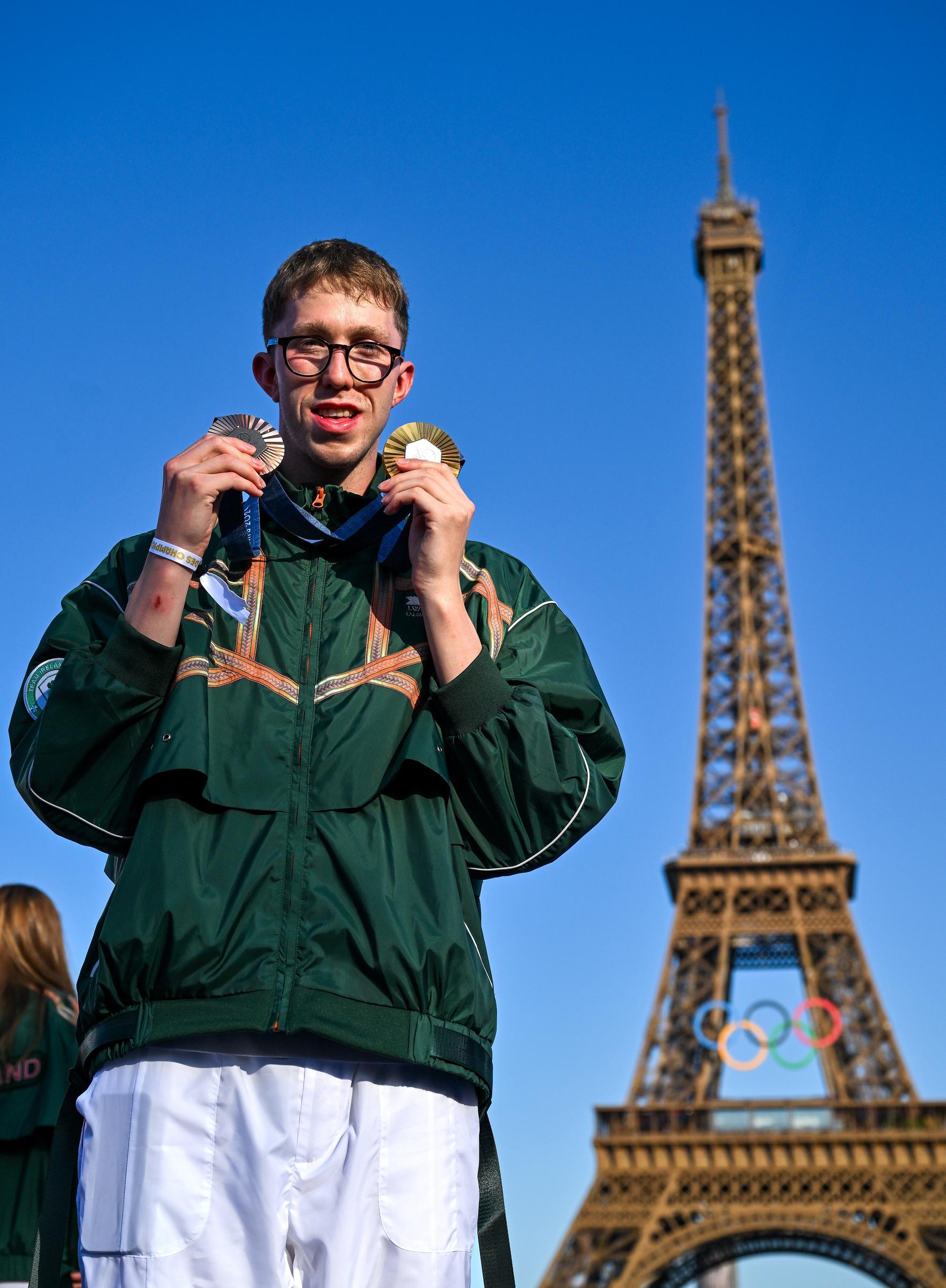
Daniel Wiffen at the Champions Park during the 2024 Summer Olympic Games in Paris, France. | Source: Getty Images
During the medal ceremony, Wiffen smiled through his composure as the Irish national anthem played. In the final moments, tears of joy rolled down his face, which he quickly wiped away before posing with his fellow medalists.
Once the ceremony concluded, he sprinted over to his family, embracing them in heartfelt hugs. Wiffen's second win came days later, on August 4, 2024, when he competed in the 1500m freestyle and won bronze.
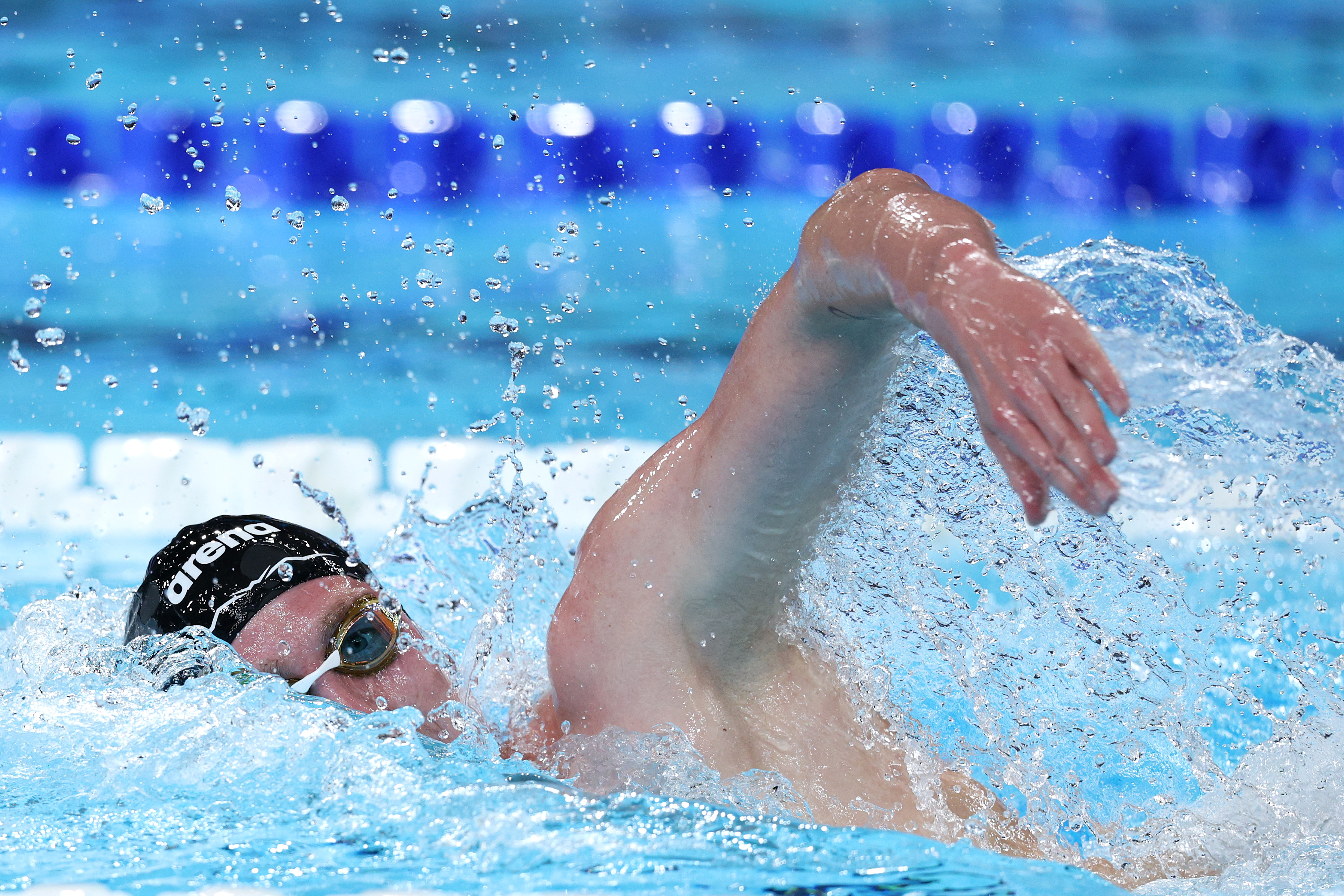
Daniel Wiffen competing in the Men's 1500m Freestyle Final at the Olympic Games Paris 2024 on August 4, 2024 in Nanterre, France | Source: Getty Images
Unfortunately, alongside his victory came a setback. The 23-year-old fell ill and sought hospital treatment after competing in the Seine River. He shared a post on X, on August 12, 2024, which read, "Yesterday I rushed to hospital as I was very unwell with a bug that I am being treated for, and am feeling better now."
Wiffen was deeply disappointed to miss the Closing Ceremony and the opportunity to be the flag bearer. He expressed gratitude to those who reached out, acknowledging his regret at not being able to participate.
The athlete hoped everyone enjoyed the evening and looked forward to recovering and reconnecting with others upon returning home.
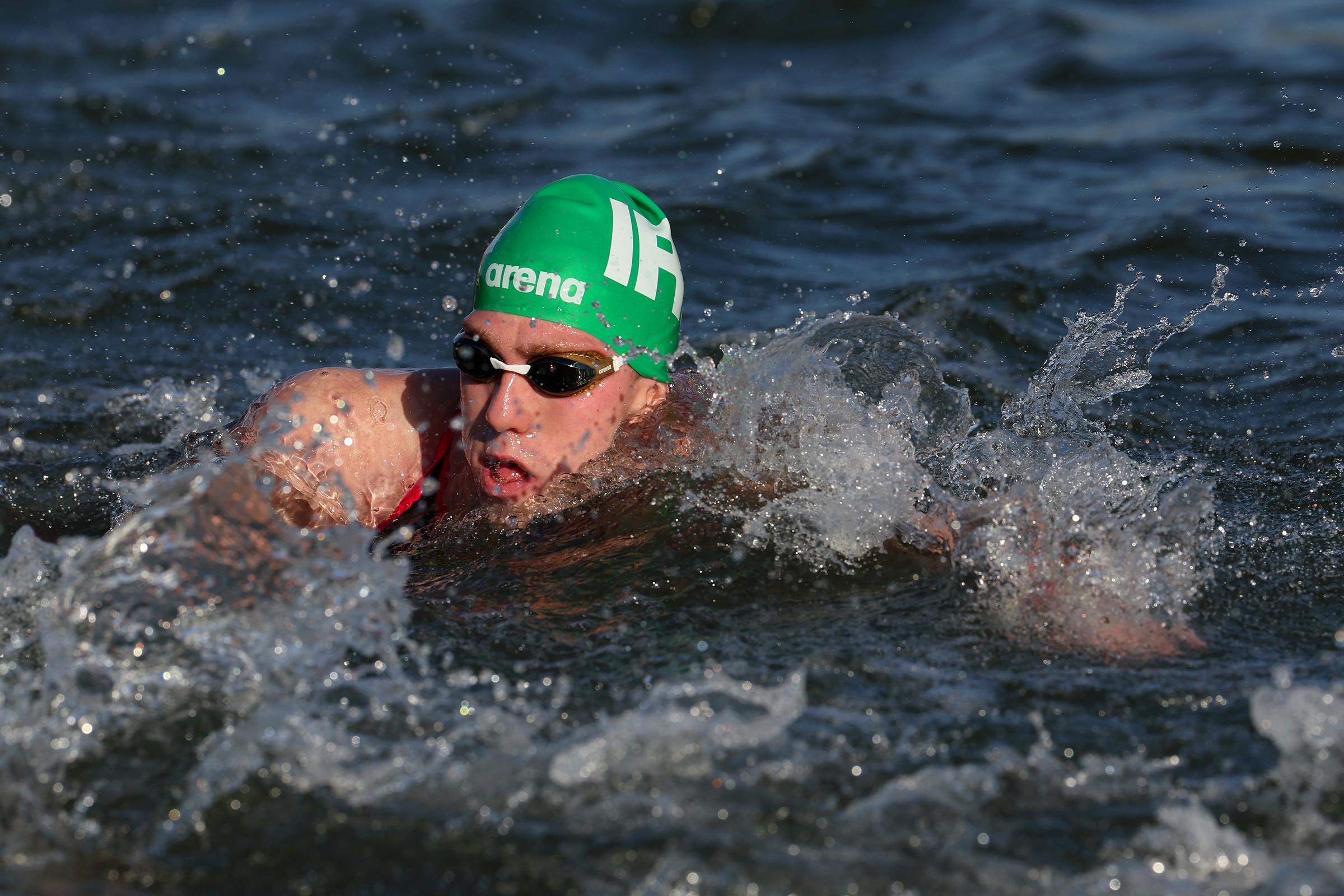
Daniel Wiffen competing in the Marathon Swimming Men's 10k event at the Olympic Games in Paris, France, on August 9, 2024 | Source: Getty Images
His fans flocked to the comment section wishing him a quick recovery. One fan told him, "Swimming in the river came at a price. But we still love you. Even down here in Australia. Get better soon. ❤️."
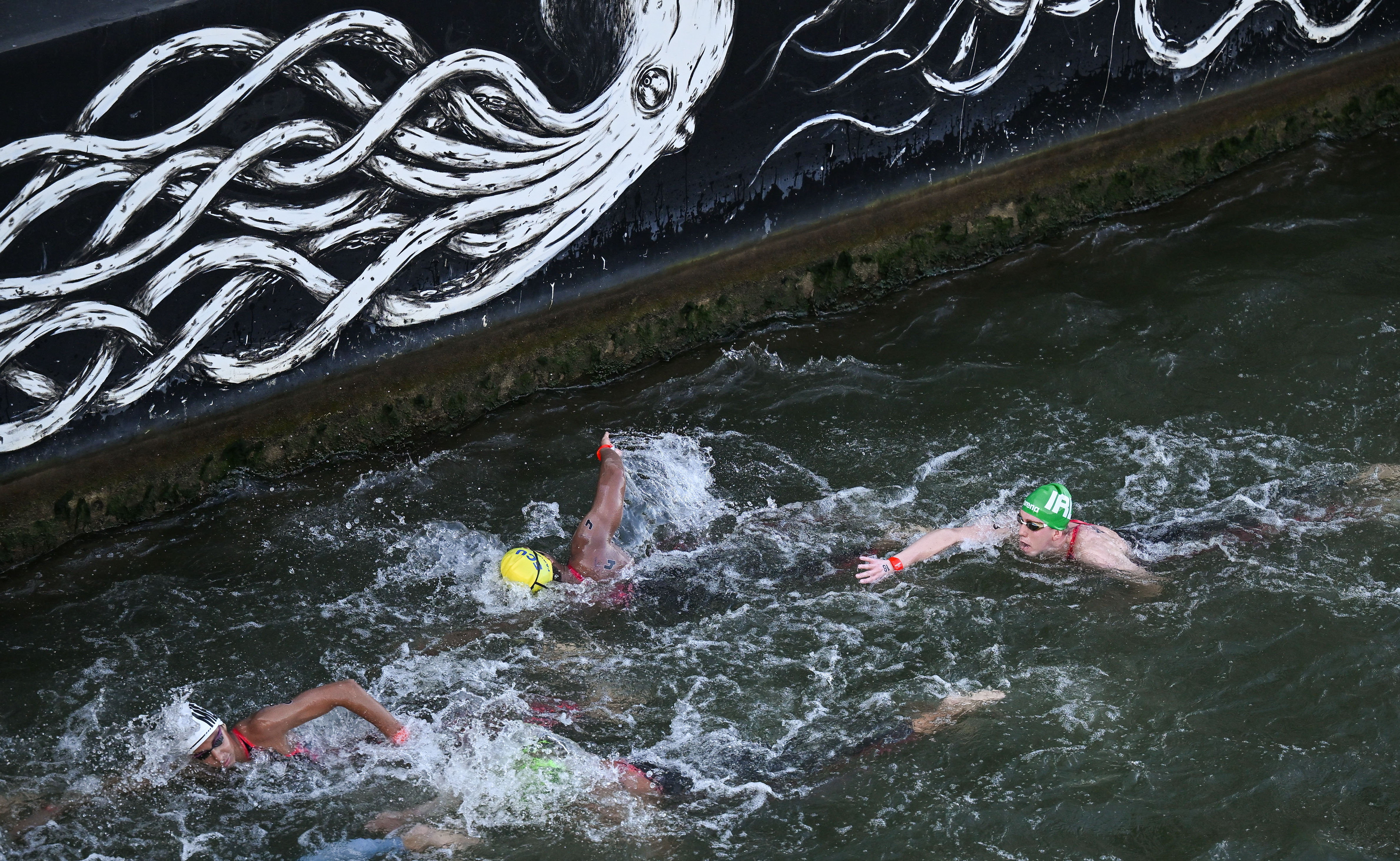
Daniel Wiffen (r) during the Men's 10km Marathon swim at the 2024 Summer Olympic Games in Paris, France, on August 9, 2024 | Source: Getty Images
Another fan hilariously noted, "Swimming in that river was inseine! Sorry I'll get my jacket. Get well soon." More fans sent their love to Wiffen, saying, "Ah that's too bad. Get well soon…. That river swim has a lot to answer for 🤢."
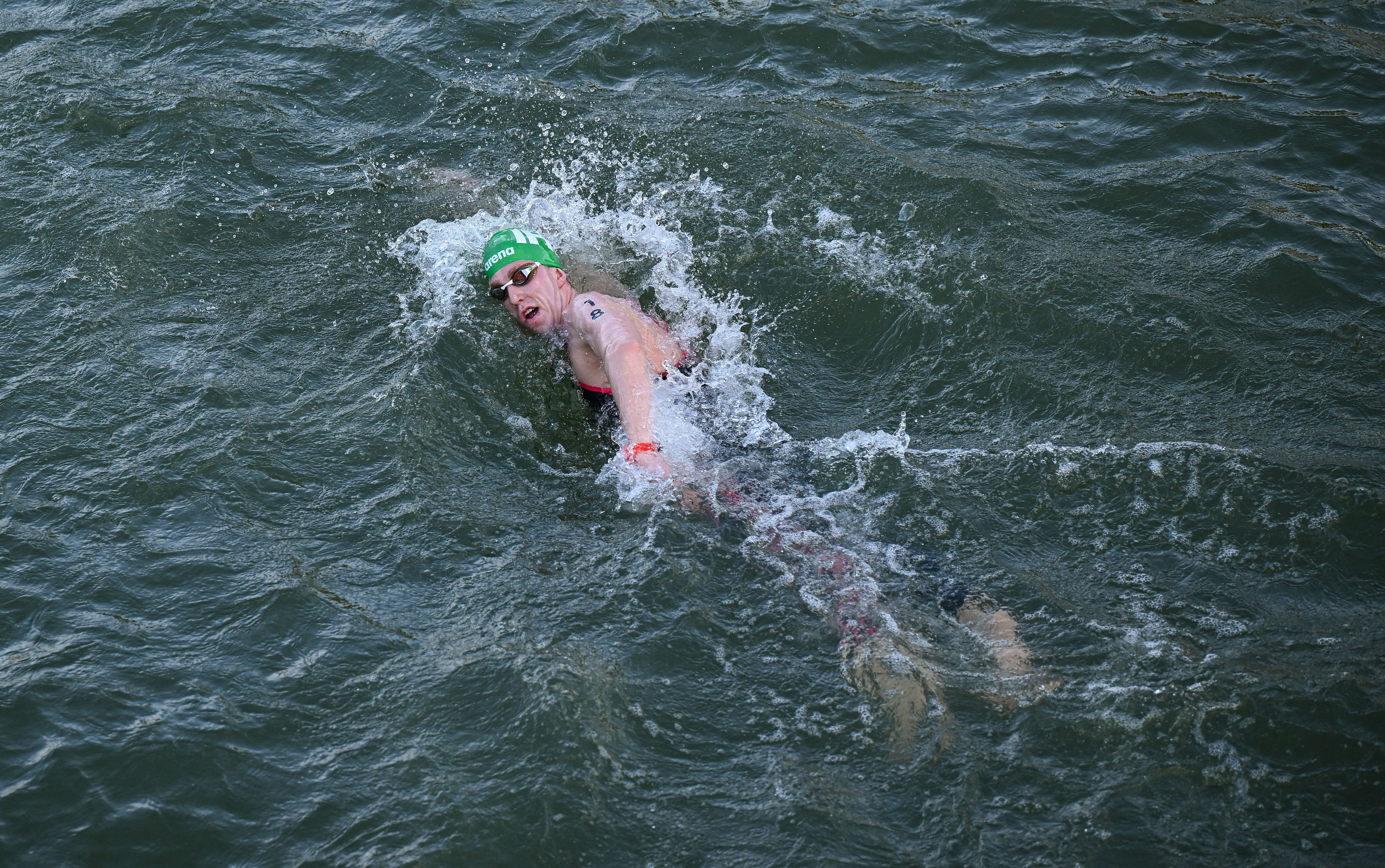
Daniel Wiffen competing in the Marathon Swimming Men's 10k event at the Olympic Games in Paris, France, on August 9, 2024 | Source: Getty Images
Claire Michel
Belgian triathlete Claire Michel also fell ill after a swim in the Seine River. She shared a health update on Instagram following recent media reports about her health status.
In her latest message, Michel thanked the medical teams at the Olympic Village and back home in Belgium for their exceptional care as she recovers from the illness.
"Blood tests showed that I contracted a virus (not E. Coli). After three days of vomiting and diarrhea, which left me quite empty, I ended up needing more significant medical attention and spent the Sunday at the clinic," she explained more on Instagram
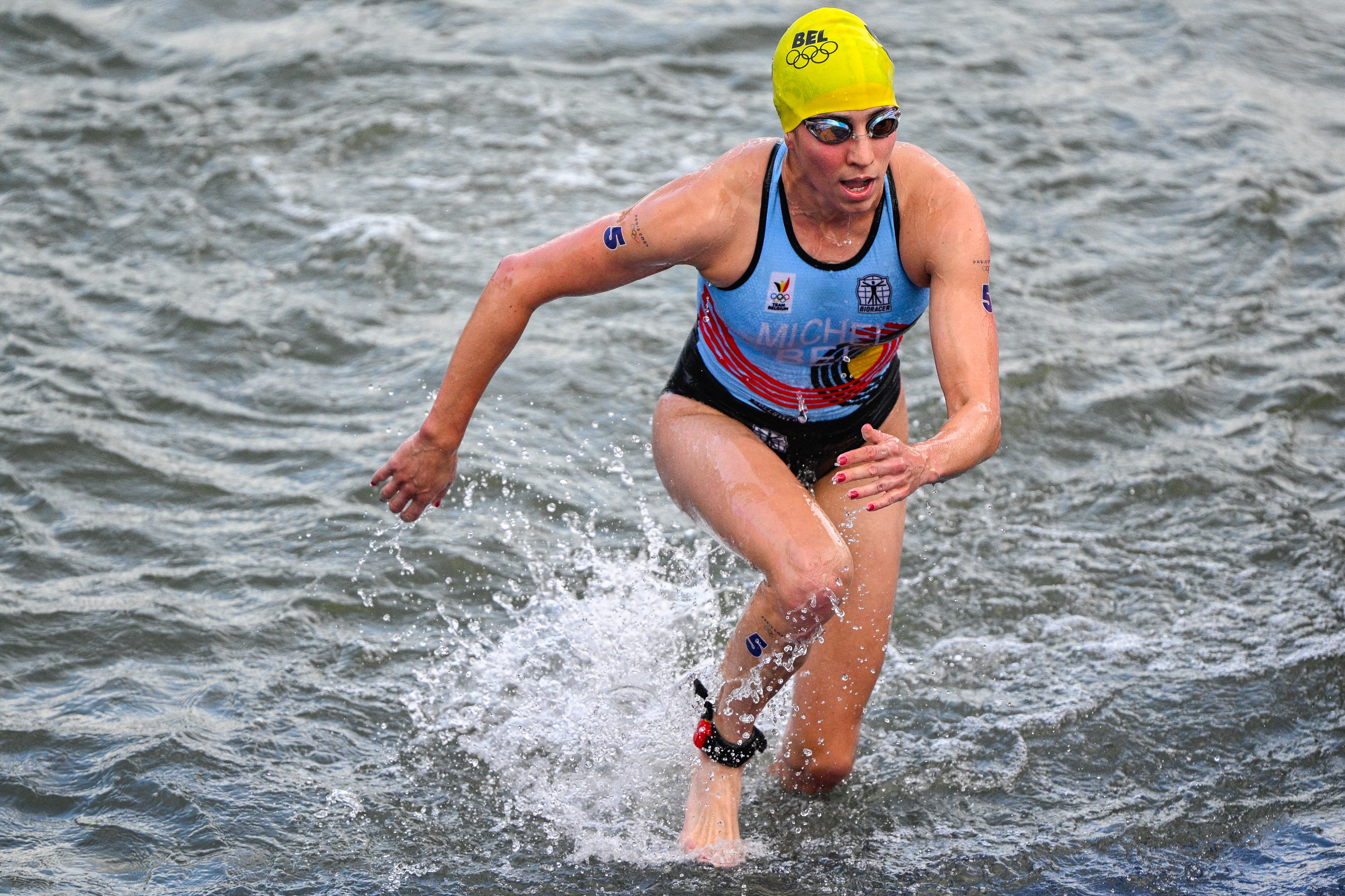
Claire Michel during the Women's Individual Triathlon race at the Paris 2024 Olympic Games on July 31, 2024 | Source: Getty Images
Michel's illness forced her team to withdraw from the mixed relay event at the Olympic Games. Despite the support and understanding from her team, she expressed her disappointment over missing out on the chance to compete.
The swimmer conveyed her heartfelt sympathy to her teammates who also missed their opportunity to race. Reflecting on the relay's history, Michel noted Belgium's strong relay tradition.
The team, which began in Tokyo with a 5th place finish in the Triathlon Mixed Team Relay, aimed to improve upon that performance and inspire future generations.
Therefore, Michel noted, "So if I have one wish for the future generation of Belgian Hammers it's that not only will you always fight until the end, but you will also support each other to the end."
The athlete also expressed gratitude for the outpouring of get-well-soon messages and promised to get back to everyone as she continues her recovery.
Three German Swimmers
Three German swimmers were also among the athletes who suffered from illness following their participation in the open water races at the Paris 2024 Olympics. This event also took place in the Seine River.
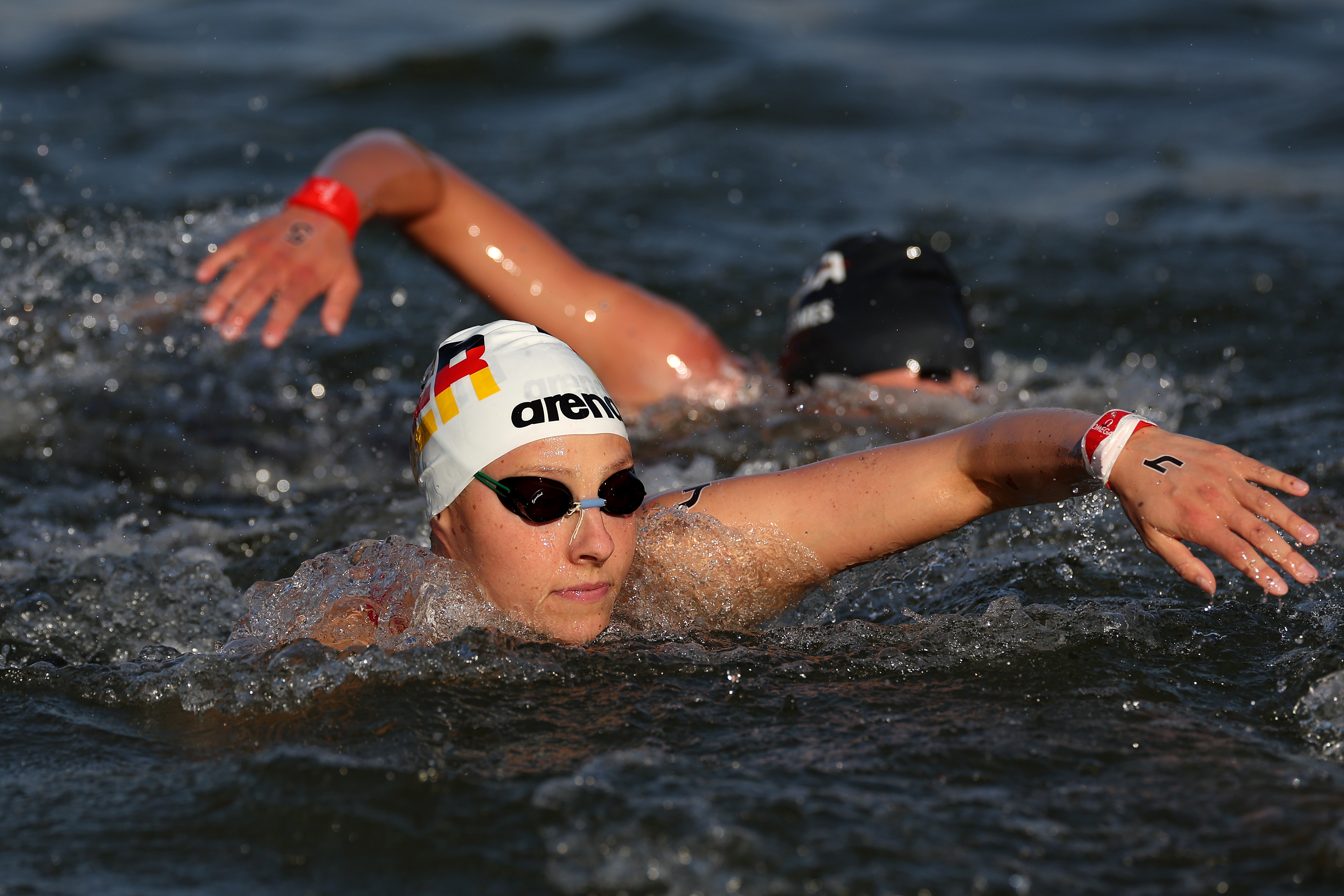
Leonie Beck competes in the Marathon Swimming Women's 10k at the Olympic Games in Paris, France, on August 8, 2024 | Source: Getty Images
The German Olympic Sports Confederation said two female swimmers were treated as outpatients for nausea, vomiting, and diarrhea. In a statement released on August 3, 2024, they added that these two athletes reported significant improvements.
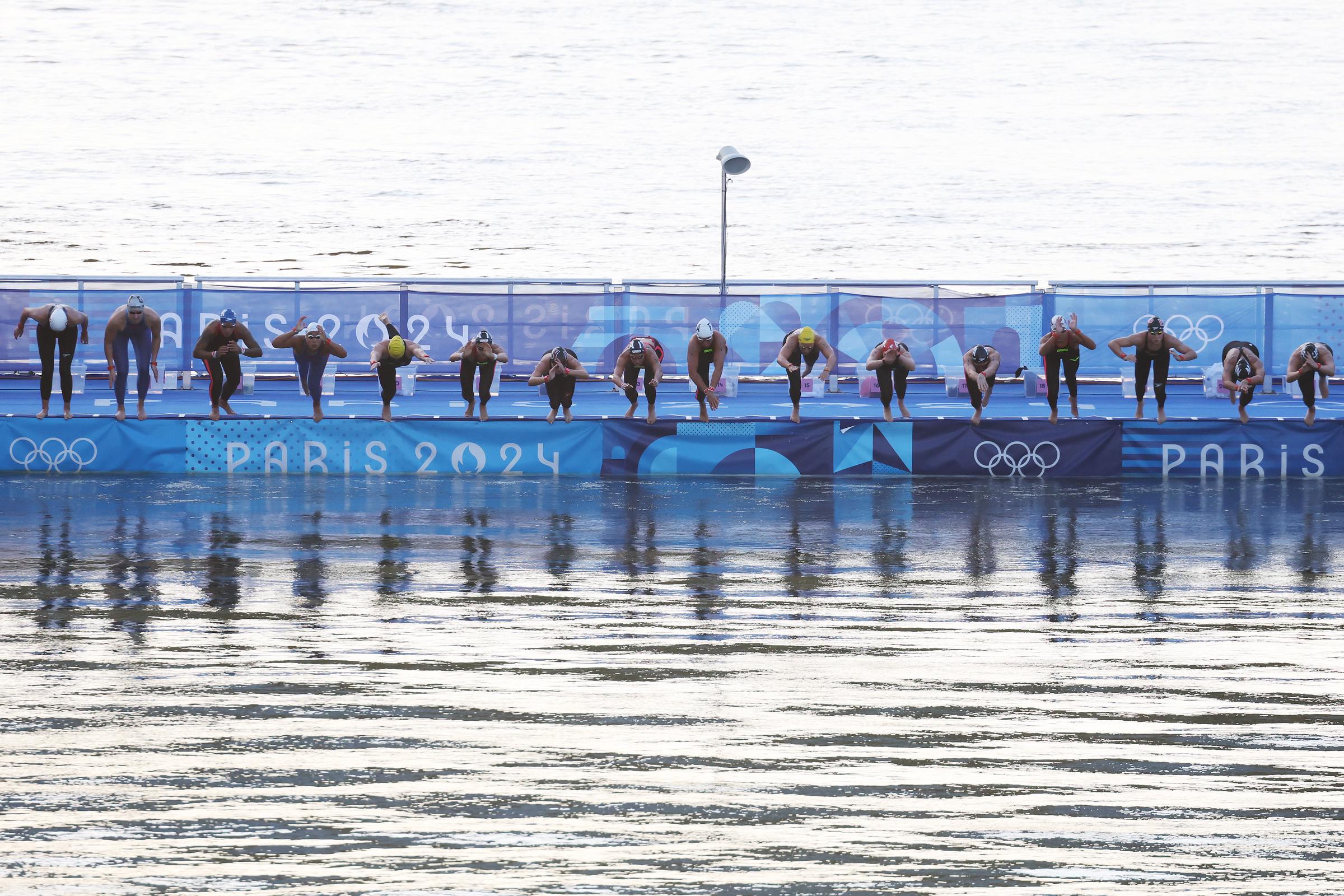
A general view as athletes dive into the River Seine to compete in the Marathon Swimming Women's 10k at the Olympic Games in Paris, France, on August 8, 2024 | Source: Getty Images
A third swimmer exhibiting similar symptoms was taken under the care of German team doctors. The German committee did not name the affected swimmers in their statement.
However, swimmer Leonie Beck, who finished ninth in the 10-kilometer event, took to social media to disclose her condition.
The swimmer looked ill in a now-deleted photo she shared on Instagram, where she gave a thumbs up. She sarcastically highlighted the water quality issue in the Seine River, noting her severe symptoms, which included repeated vomiting and diarrhea.
Beck is convinced that her illness was due to the river, whereas the German Olympic committee indicated that tests suggested it was "feasible" to continue with the races. Fortunately, all three athletes have since recovered and are expected to return home as planned.

Leonie Beck arrives ahead of the Marathon Swimming Women's 10k at the Olympic Games in Paris, France, on August 8, 2024 | Source: Getty Images
Two Portuguese Athletes
The Portuguese Olympic Committee reported that Vasco Vilaça, a Portuguese triathlete, also fell ill during the Paris 2024 Olympics. He developed symptoms consistent with a gastrointestinal infection after swimming in the Seine River.
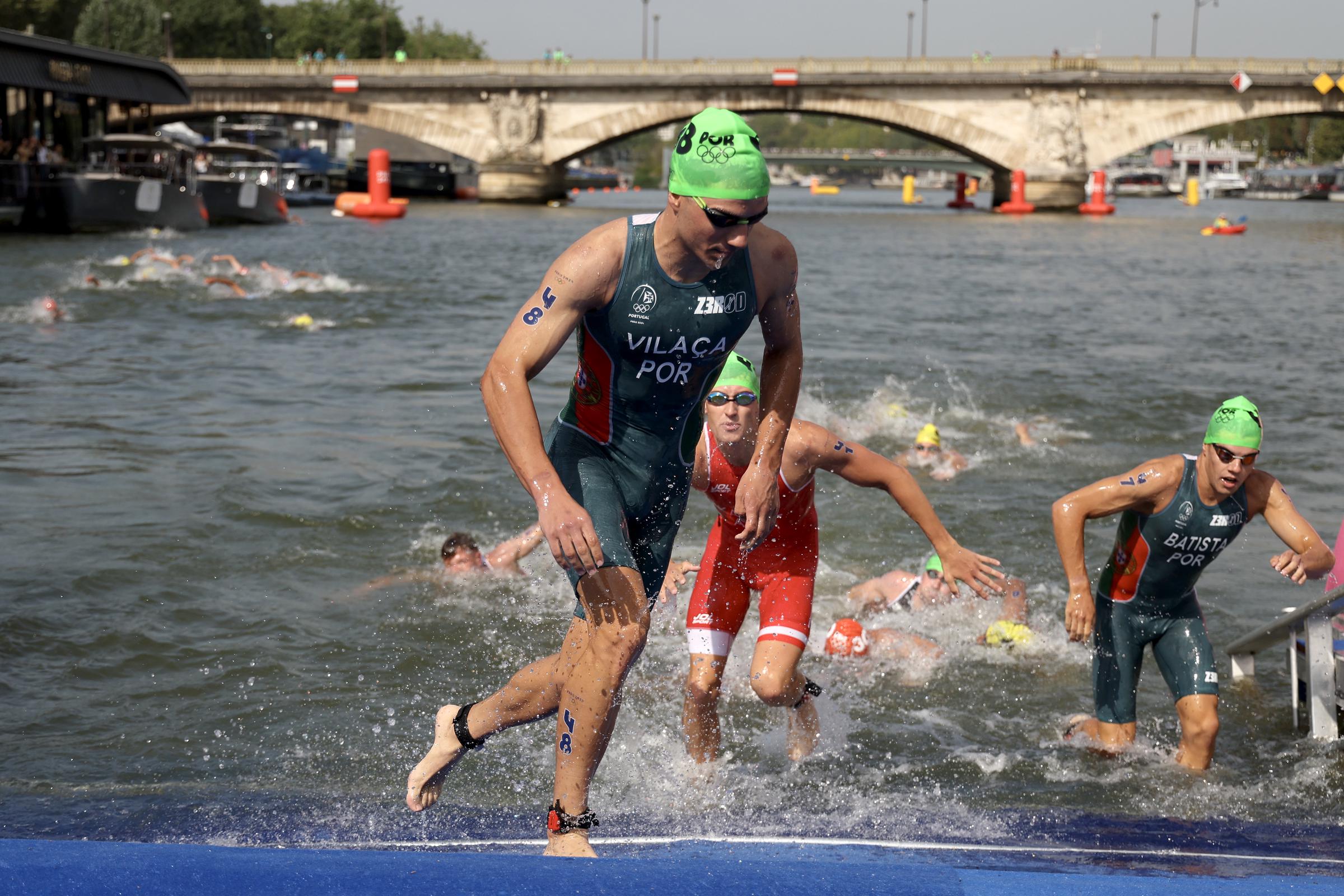
Vasco Vilaca during the Men's Individual Triathlon at the Olympic Games in Paris, France, on July 31, 2024 | Source: Getty Images
Vilaça's illness raised concerns about water quality in the river. Luckily, he attained stable clinical condition after undergoing conservative treatment by the Portuguese Olympic Committee health team at the Olympic Village.
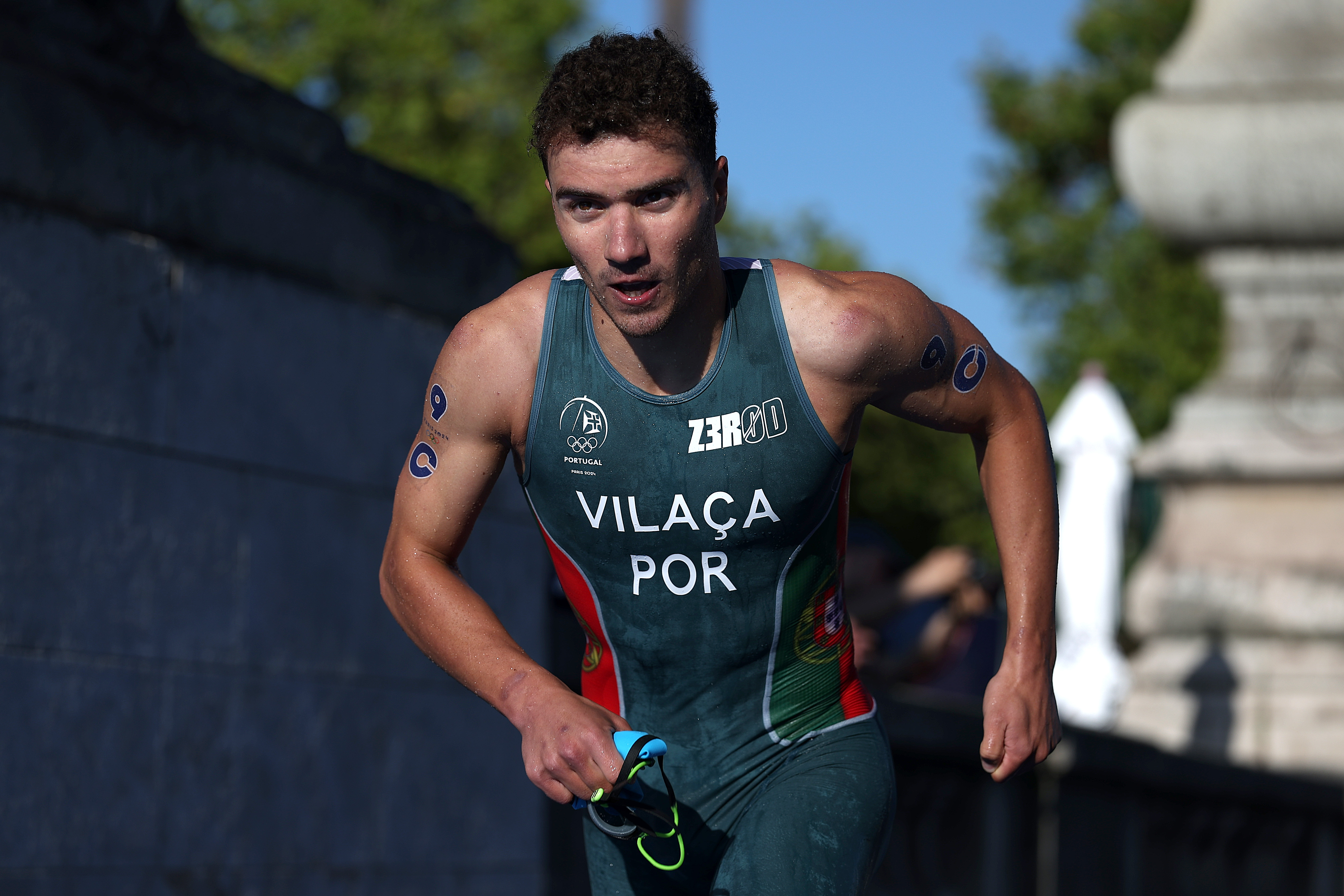
Vasco Vilaca during the Mixed Relay at the Olympic Games in Paris, France, on August 5, 2024 | Source: Getty Images
In addition to Vilaça, athlete Melanie Santos experienced similar but less severe symptoms. World Triathlon, the sport's international federation, had previously assured that water quality assessments in the Seine met the necessary regulations.
However, the presence of certain parameters still posed a risk of infection under the current environmental conditions.
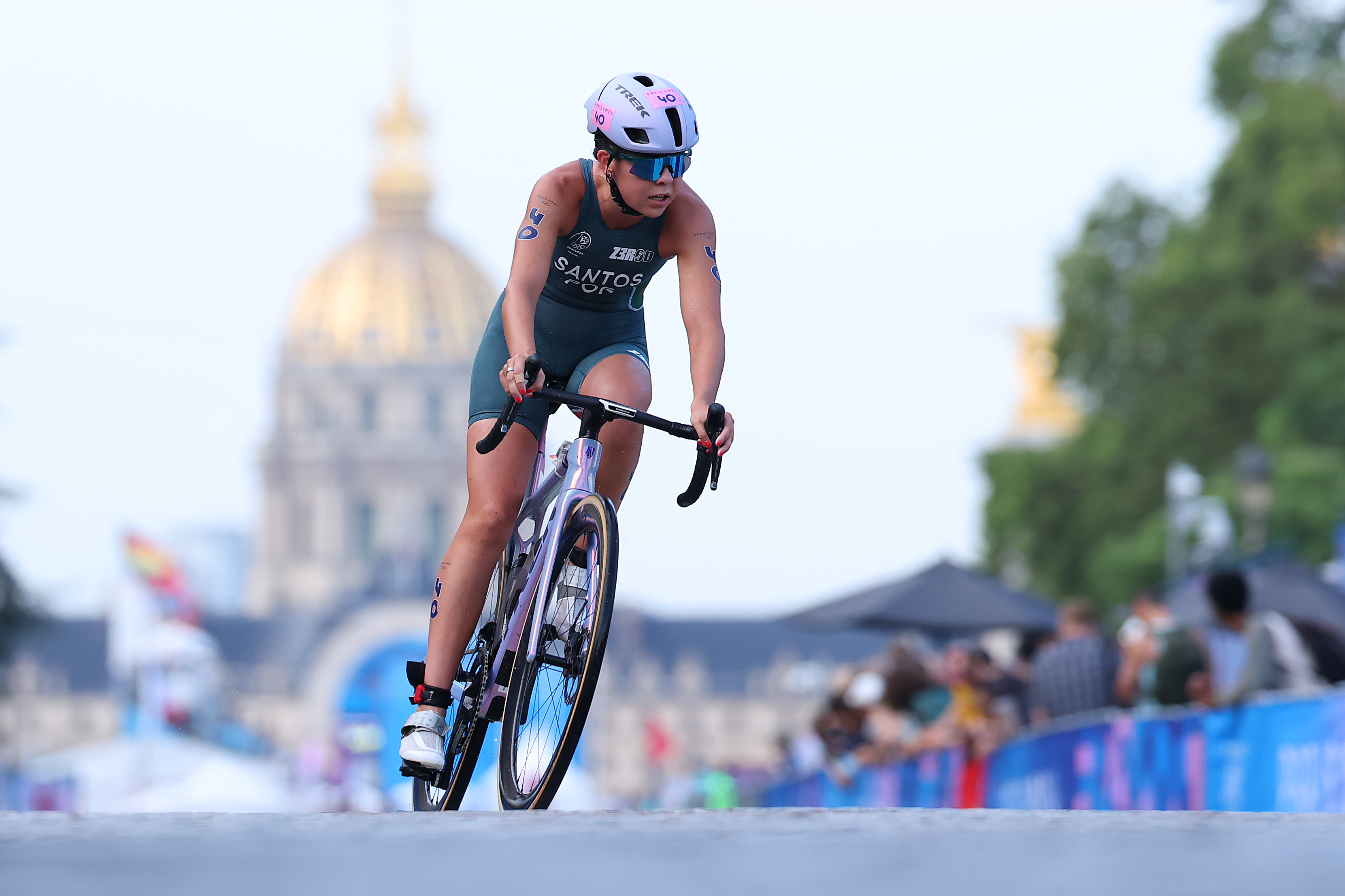
Melanie Santos competes during the Women's Individual Triathlon at the Olympic Games in Paris, France, on July 31, 2024 | Source: Getty Images
The Portuguese Olympic Committee announced that they would remain vigilant and committed to ensuring the best care for their athletes. They also emphasized their focus on preventing further health issues.
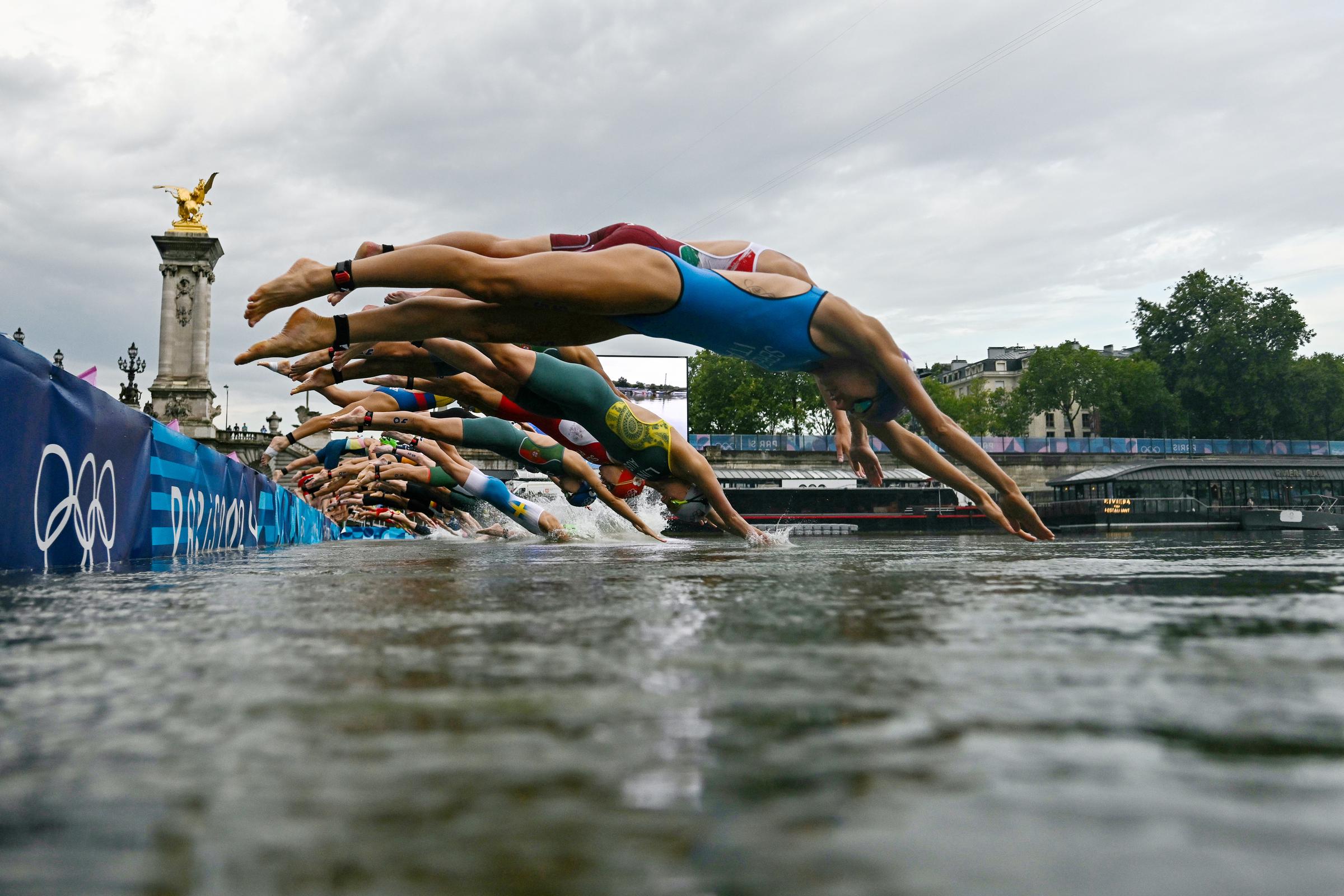
Athletes compete in the swimming race in the Seine during the Women's Individual Triathlon event at the Paris 2024 Olympic Games in Paris, France, on July 31, 2024 | Source: Getty Images
Was the Seine River Safe to Swim In?
Before the Paris 2024 Olympics, France invested an ambitious $1.5 billion in cleaning the Seine River. Organizers monitored daily water samples to evaluate the risk and decide if swimming events should proceed.
Additionally, in advance of the triathlon races, Olympic organizers conducted tests for bacterial contaminants in the river. The results met the accepted World Triathlon standards.
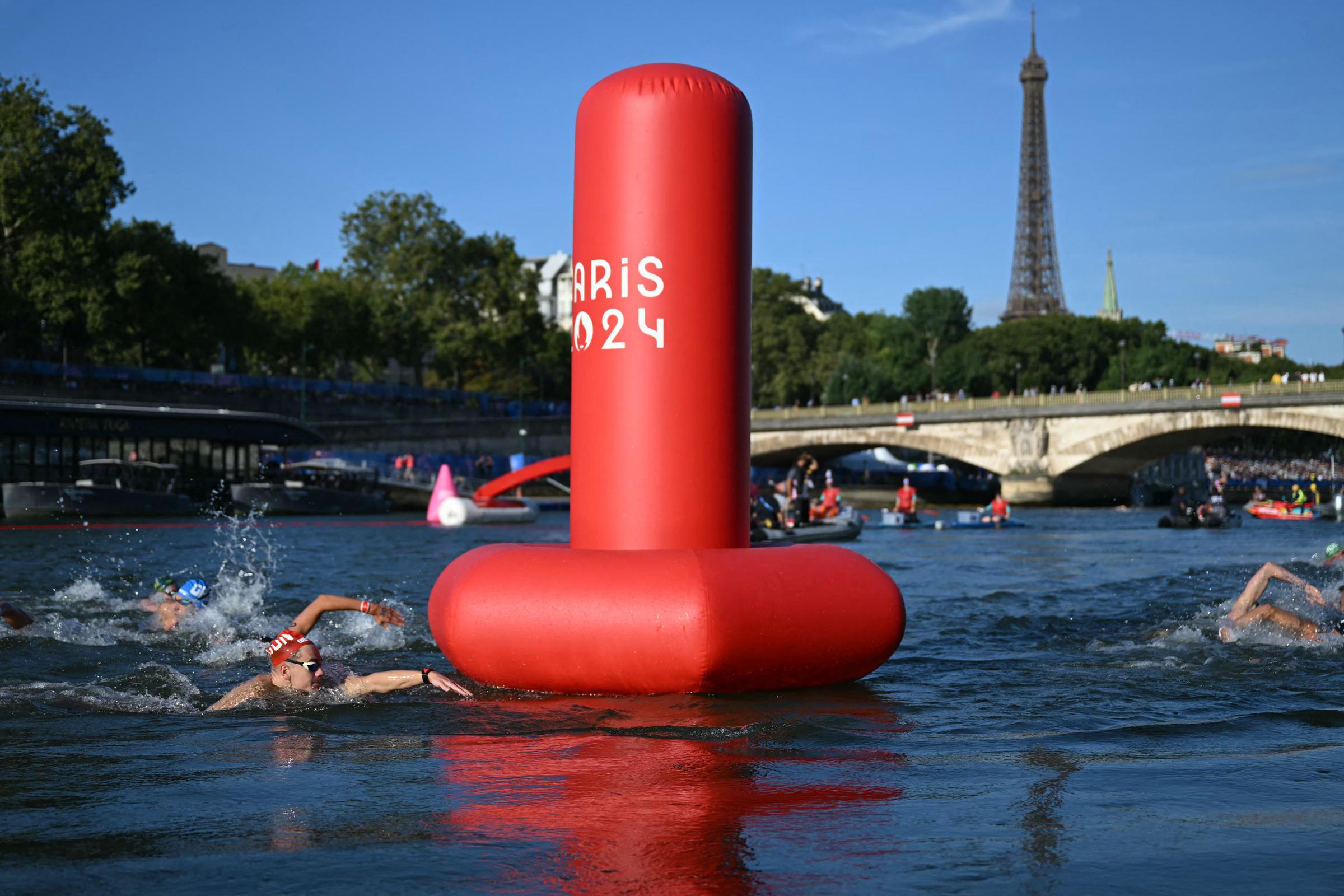
Athletes swim in the Seine River past the buoy during the Men's 10km Marathon Swimming Final at the Olympic Games in Paris, on August 9, 2024 | Source: Getty Images
Despite these efforts, bacteria levels in the river fluctuate frequently. Water quality in the river is closely influenced by weather conditions. For instance, heavy rainfall leads to increased bacteria from wastewater and runoff, whereas sunlight helps reduce bacteria levels.
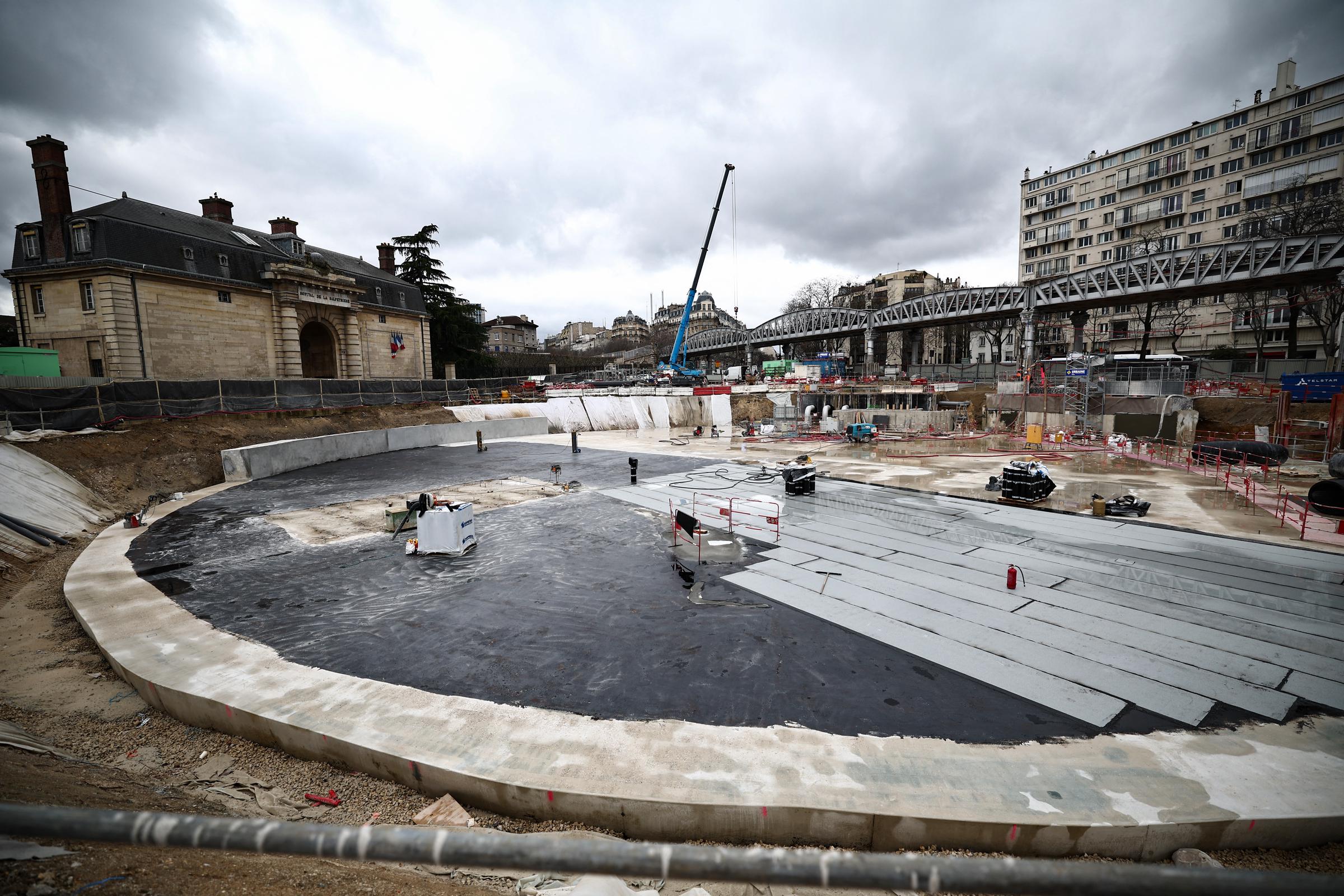
The construction site of the 30-meter-deep Austerlitz basin, a river Seine water storage and treatment basin, aiming to make the river cleaner for the Paris 2024 Olympic Games. | Source: Getty Images
So, France constructed a massive basin to capture excess rainwater and prevent wastewater from flowing into the river. Additionally, they renovated sewer infrastructure and upgraded wastewater treatment plants.
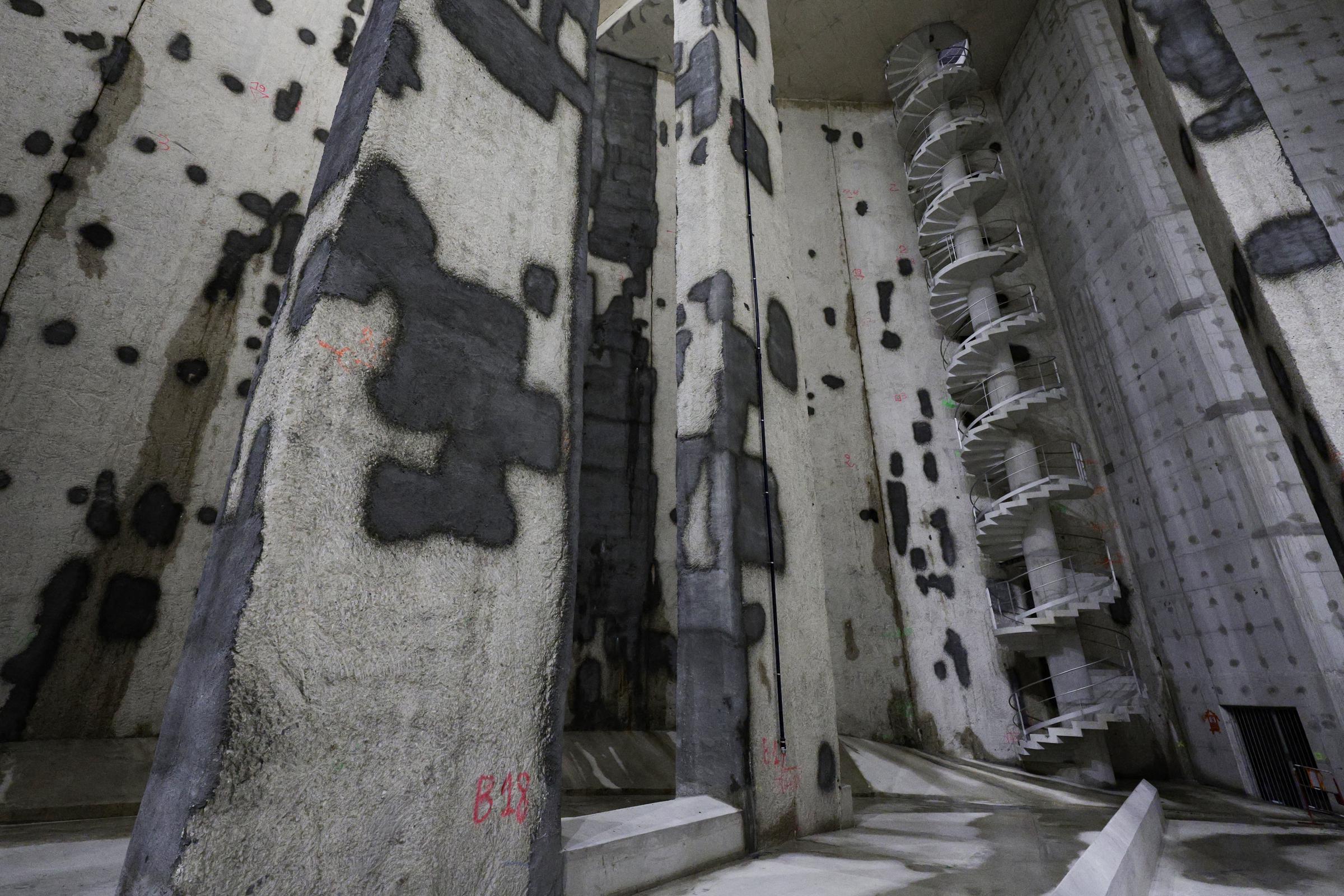
The inside of the Austerlitz wastewater and rainwater storage basin, intended to make the Seine swimmable during the Paris 2024 Olympic Games | Source: Getty Images
Testing also provided valuable risk assessments. However, quantifying the precise risk remains challenging, according to Metin Duran, a professor of civil and environmental engineering at Villanova University.
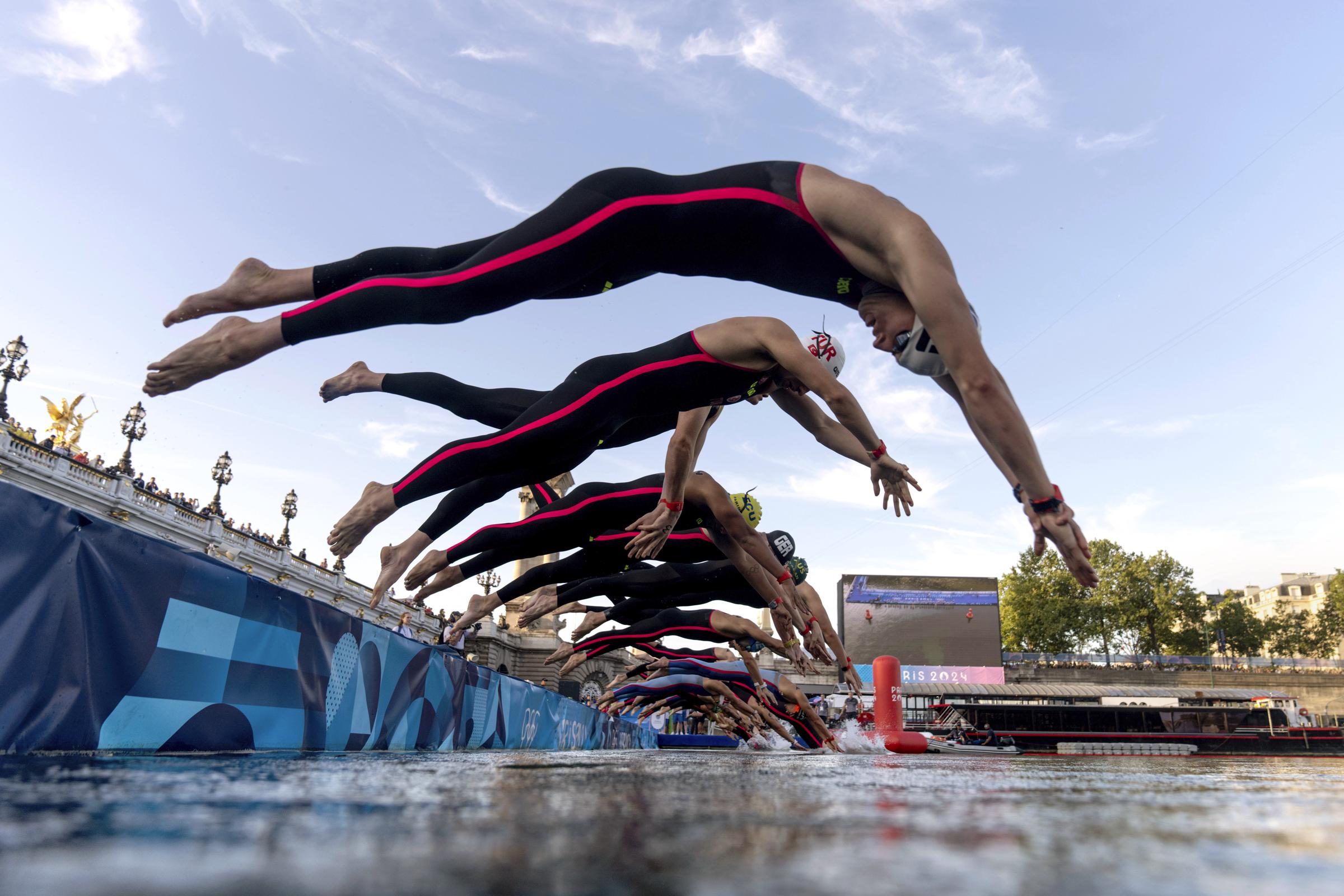
Competitors dive into the Seine River for the start of the Marathon Swimming Men's 10km event at the 2024 Paris Olympics on August 9, 2024 | Source: Getty Images
"Unfortunately, there is not much to do prior to exposure to reduce the risk," noted Duran. Even ingesting a small amount of contaminated water can cause diarrhea and lead to illnesses such as urinary tract or intestinal infections.

The Bir Hakeim bridge over the Seine River in Paris during the 2024 Olympic Games on August 10, 2024. | Source: Getty Images
Furthermore, the risk of falling ill from E. coli exposure varies based on several factors, including an individual's age and overall health. "Generally speaking, the healthier you are, the more likely you’re going to be to withstand any sort of pathogen," said Brian Rahm.
Rahm, a biological and environmental engineering expert at Cornell University, pointed out that while E. coli is a concern, it's not the only issue. Its presence often indicates that other harmful pathogens, such as additional bacteria and viruses, might also be present in the water.
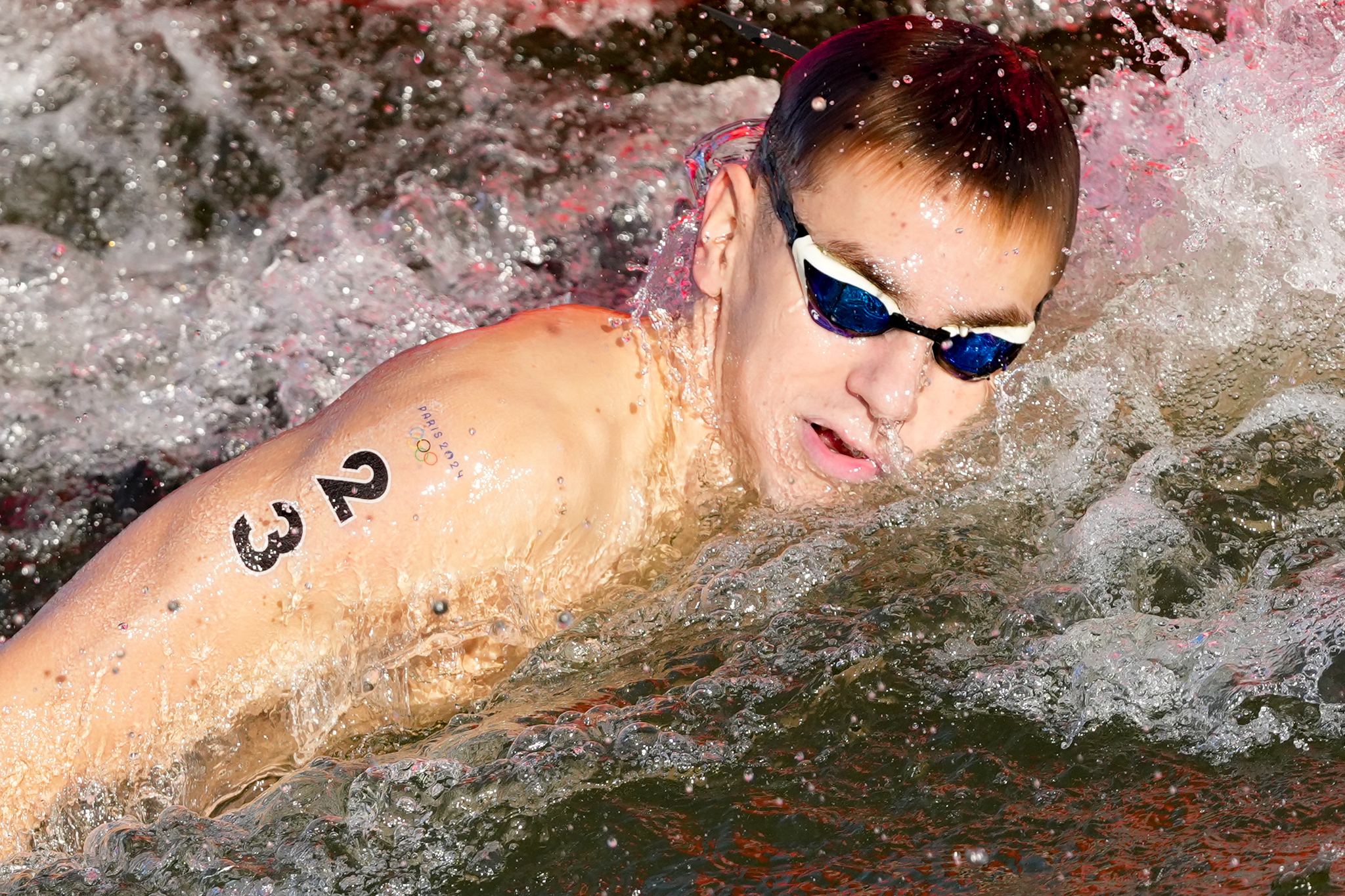
David Betlehem competes in the Marathon Swimming Men's 10k at the Olympic Games in Paris, France, on August 9, 2024 | Source: Getty Images
Dan Angelescu, founder and CEO of Fluidion, conducted multiple daily tests of the river water. His company measured both free-floating bacteria and those attached to particles such as fecal matter or sediment.
Angelescu explained that his comprehensive testing approach offers a more detailed view compared to the city's lab tests.
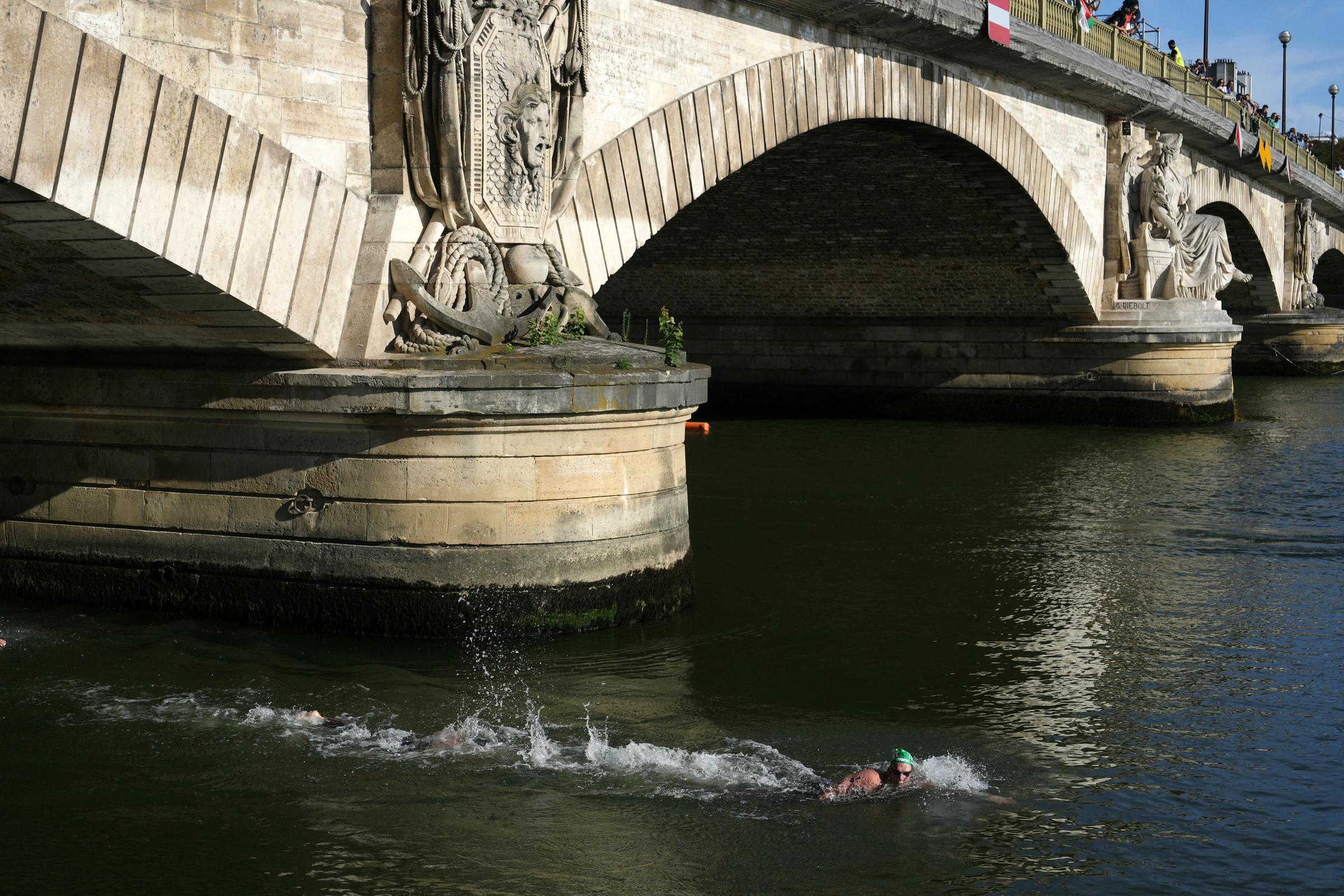
Kristof Rasovszky swims in the Seine River to the finish line during the Men's 10km Marathon Swimming Final at the Paris 2024 Olympic Games on August 9, 2024 | Source: Getty Images
Angelescu compared it to observing a busy road and counting all individuals and vehicles from a ground-level perspective, versus counting from a helicopter where visibility is limited.
He noted that the city's method provided a general overview. However, his approach offered a more thorough count by examining each component closely.
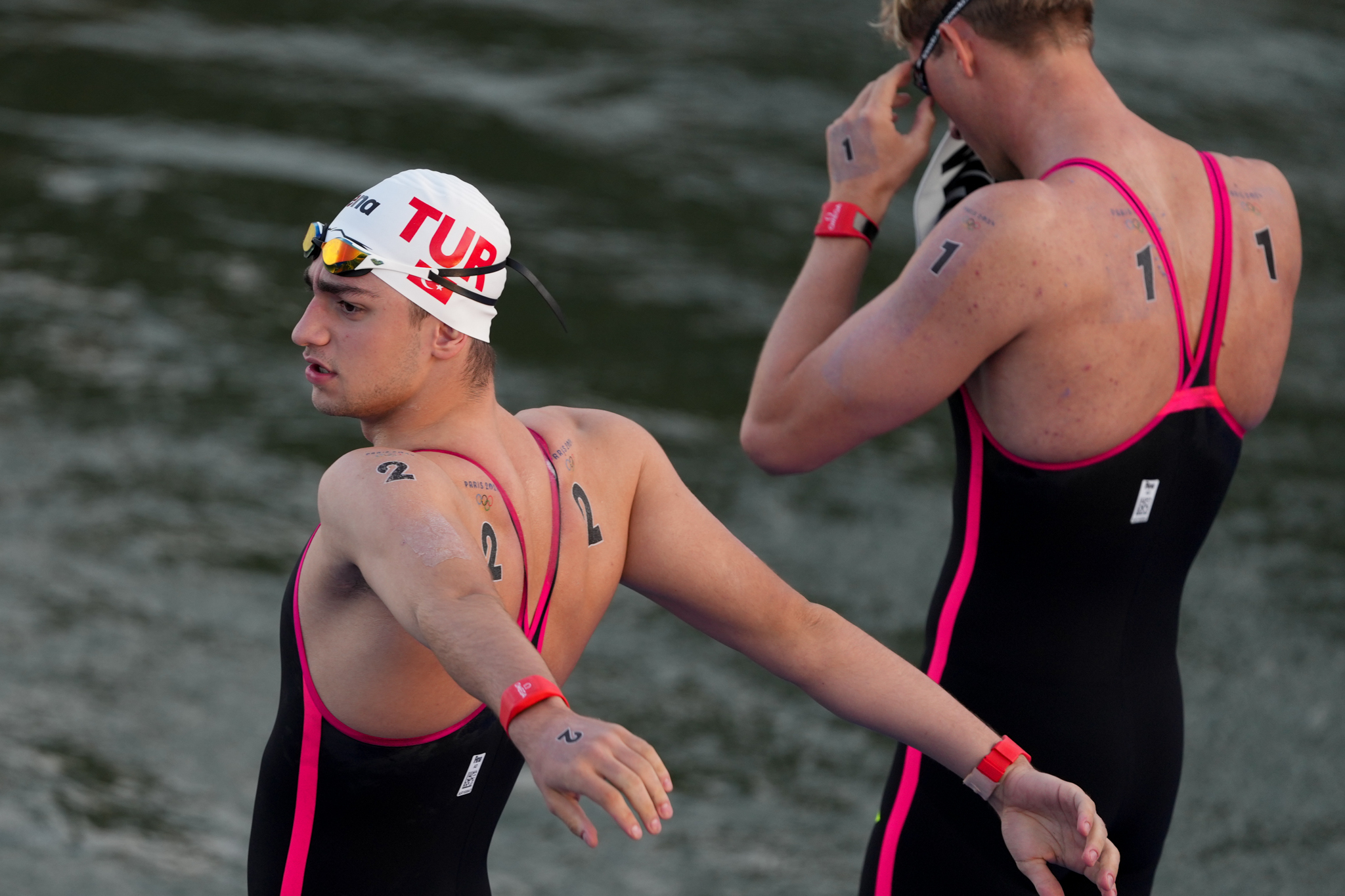
Emir Batur Albayrak competes in the Marathon Swimming Men's 10km event at the Olympic Games in Paris, France, on August 9, 2024 | Source: Getty Images
Angelescu raised these concerns with city officials, who opted to maintain their standard laboratory testing method. The officials argued that their mode aligns with existing regulations. Nevertheless, Angelescu said these regulations are flawed.
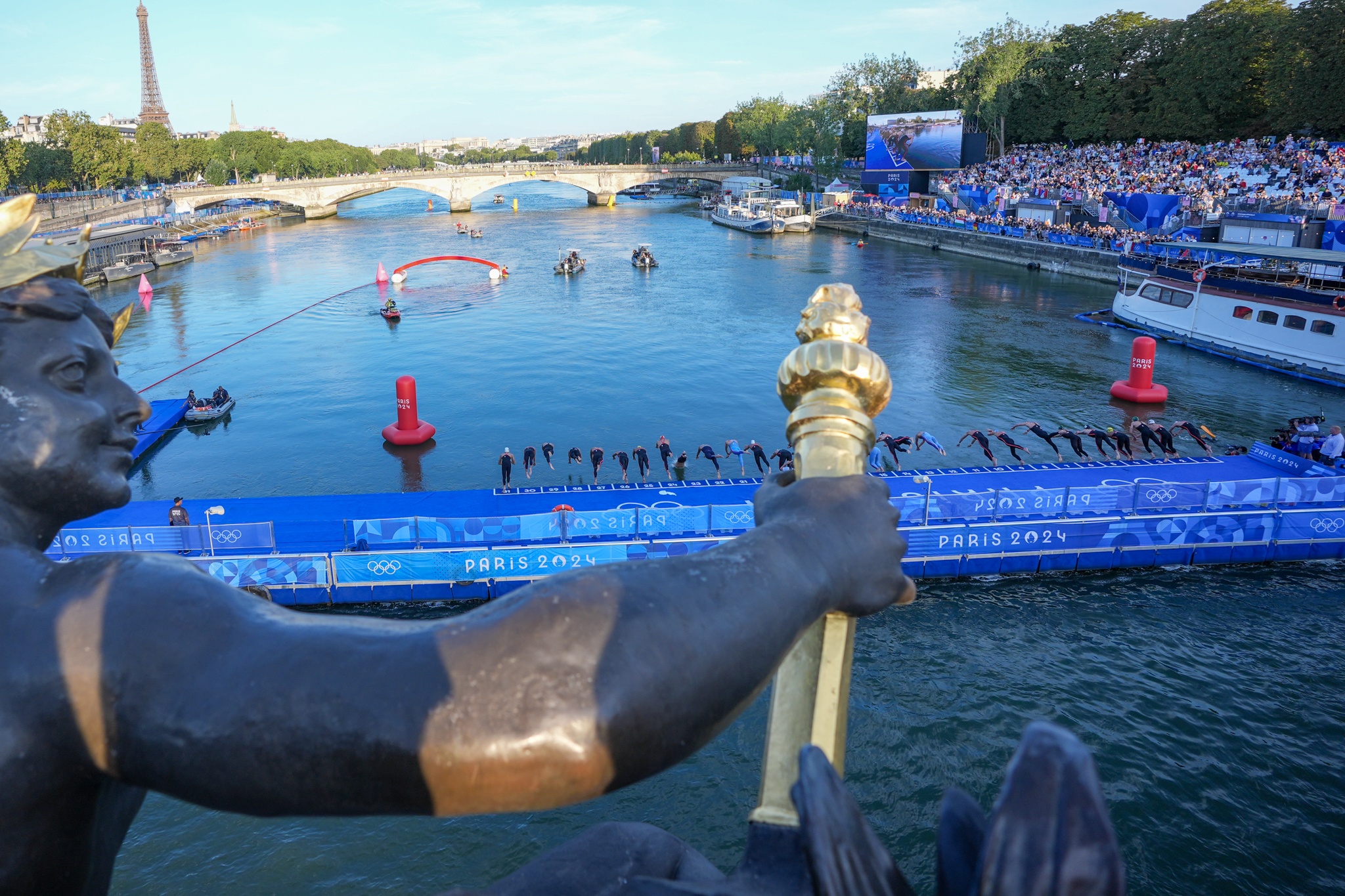
Athletes compete in the Marathon Swimming Men's 10km event at the Olympic Games in Paris, France, on August 9, 2024 | Source: Getty Images
Rahm also emphasized that from a public health standpoint, it's irrelevant whether bacteria are free-floating or embedded in particles; they can enter the body regardless.
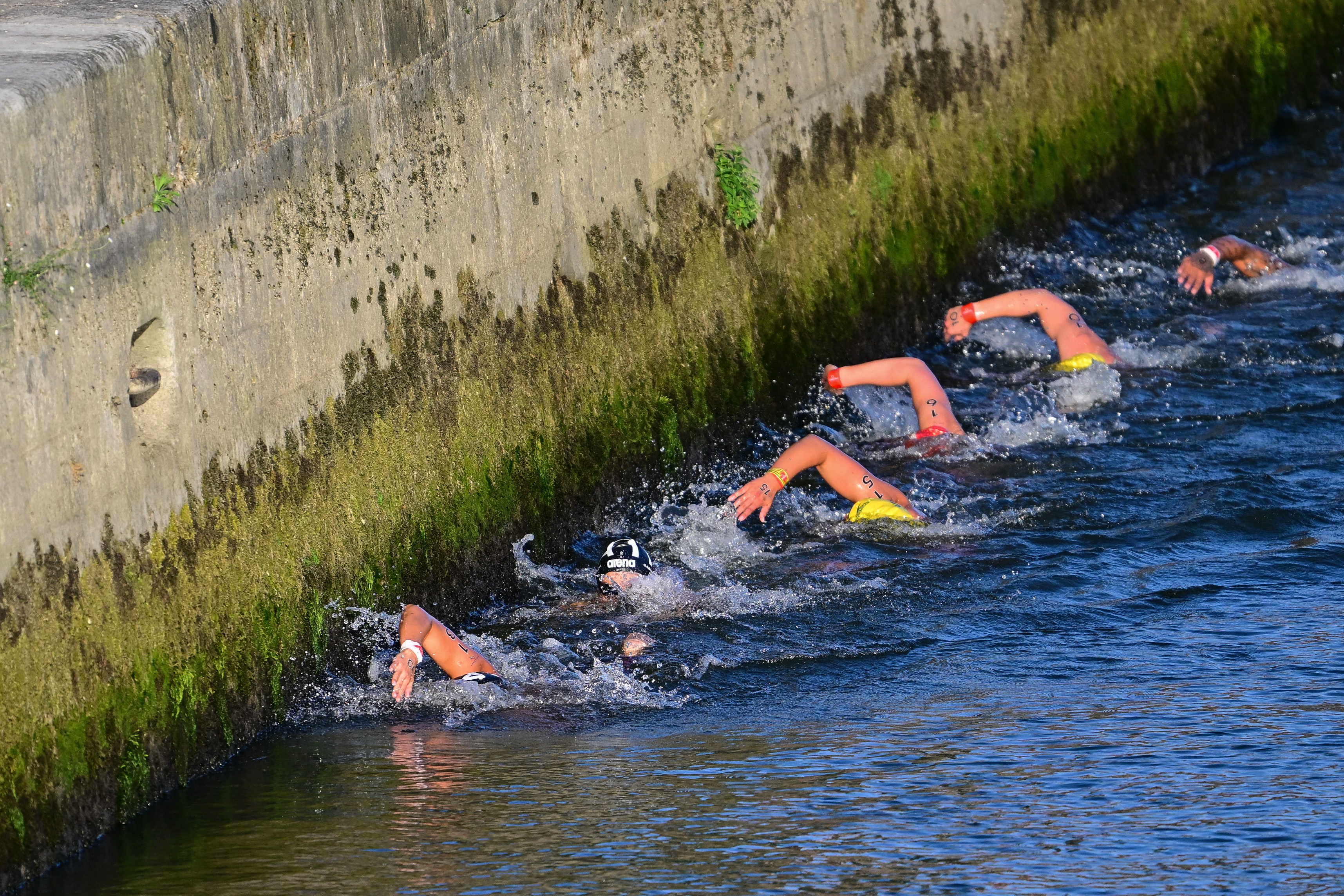
Athletes compete in the Marathon Swimming Women's 10k event at the Olympic Games Paris in Paris, France, on August 8, 2024 | Source: Getty Images
Precautions Taken by American Swimmers
Three American competitors participated in a training session in the Seine River. Nevertheless, they avoided submerging their heads to protect themselves from potential illness.
Instead, they used paddle boards to familiarize themselves with the course while minimizing the risk of ingesting contaminated water.
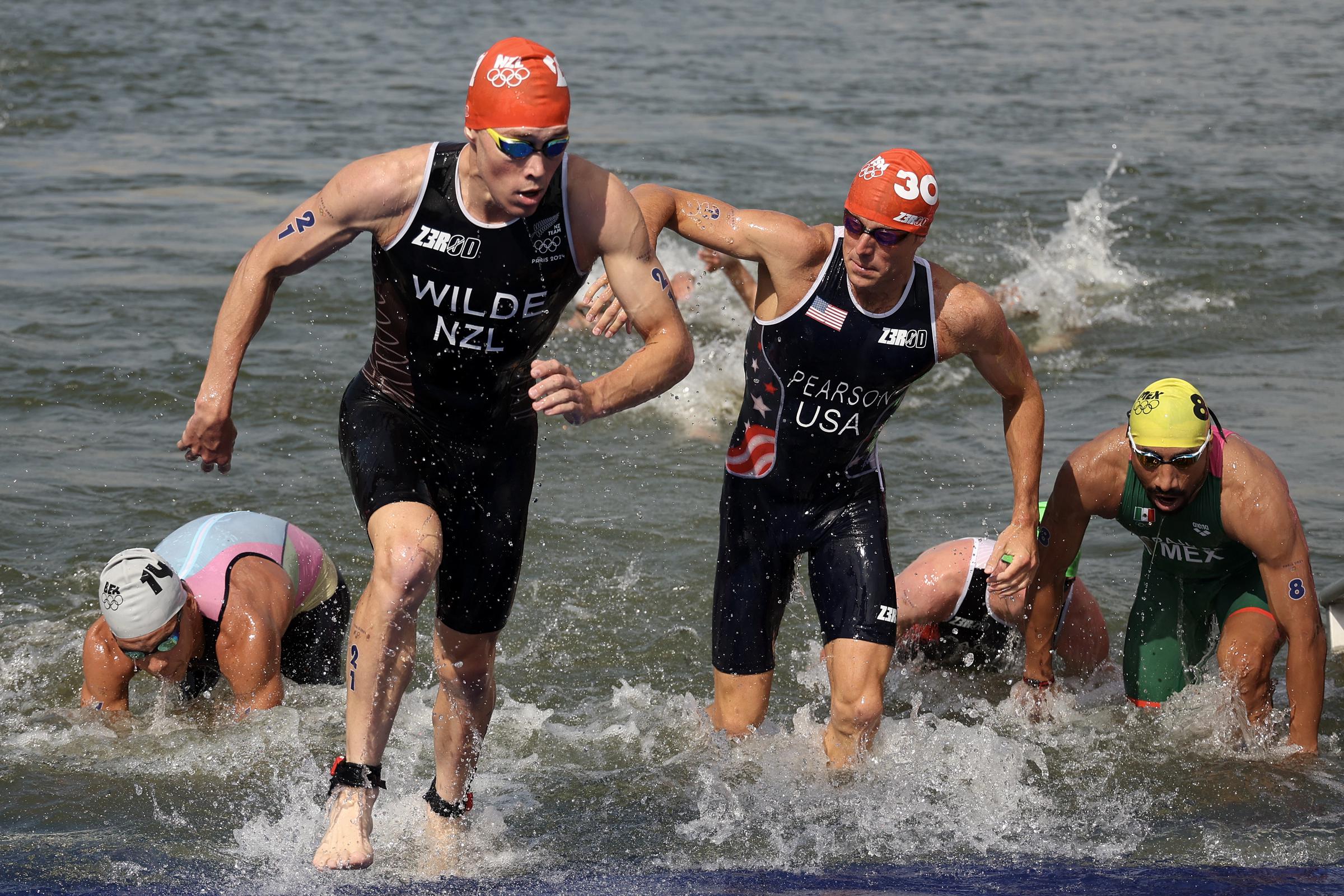
Hayden Wilde and Morgan Pearson compete during Men's Individual Triathlon at the Olympic Games Paris 2024 in Paris, France, on July 31, 2024 | Source: Getty Images
"We just wanted to mitigate the risk as much as possible of the water getting inside your body. Because even if the water is swimmable, and the levels are safe, there is still some degree of risk," swimmer Ivan Puskovitch divulged.
He added that the risk of illness in the Seine River is notably higher compared to most open-water venues. Other swimmers were also cautious about swimming in the river.
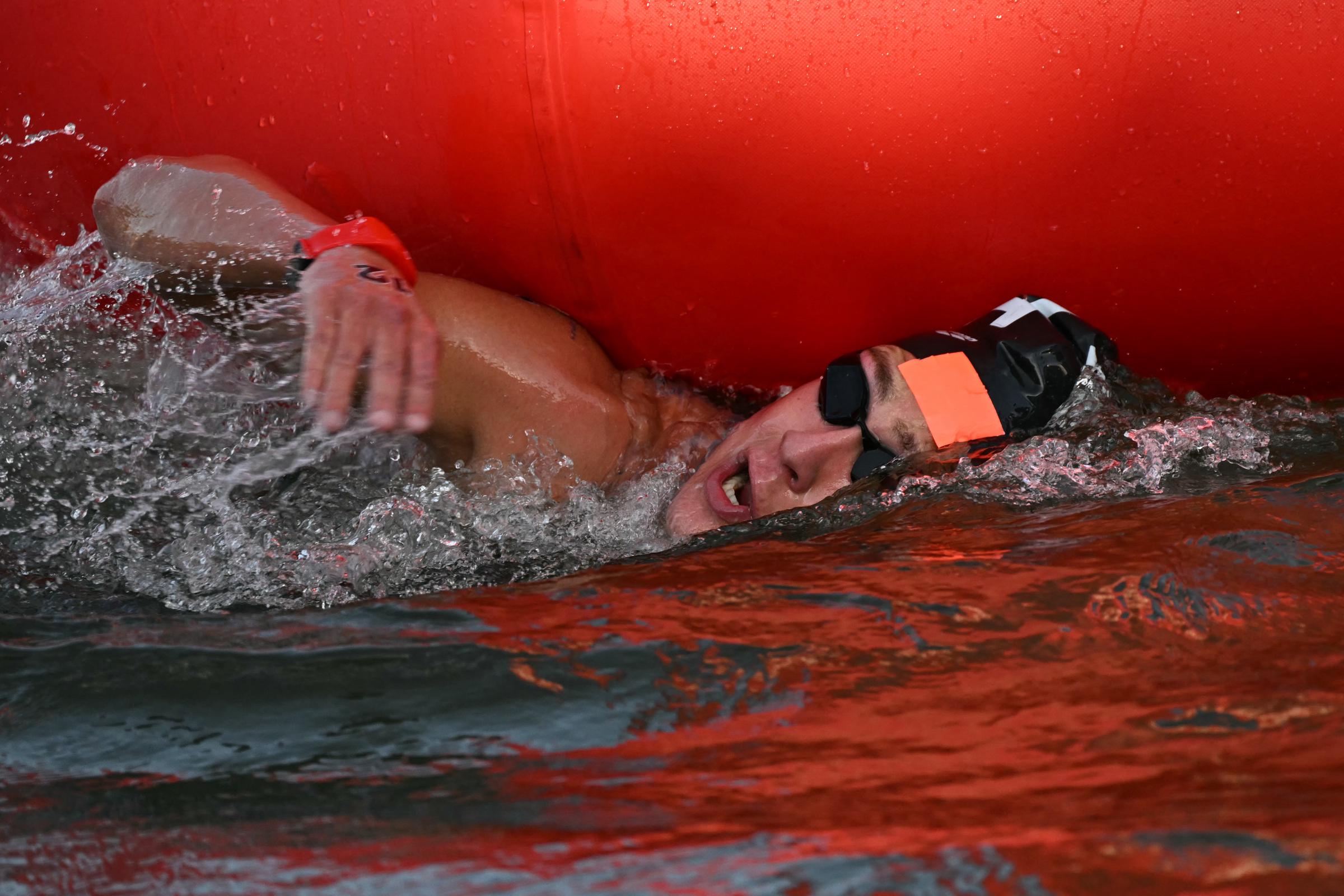
Ivan Puskovitch swims in the Seine River during the Men's 10km Marathon Swimming Final at the Paris 2024 Olympic Games on August 9, 2024 | Source: Getty Images
Austrian Swimmers Assessed Condition Before Training
Before taking the plunge, Austrian swimmers Felix Auboeck and Jan Hercog assessed the state of the river. They stood at the Pont Alexandre III, the iconic bridge that provides a view of the starting buoy and finishing line.
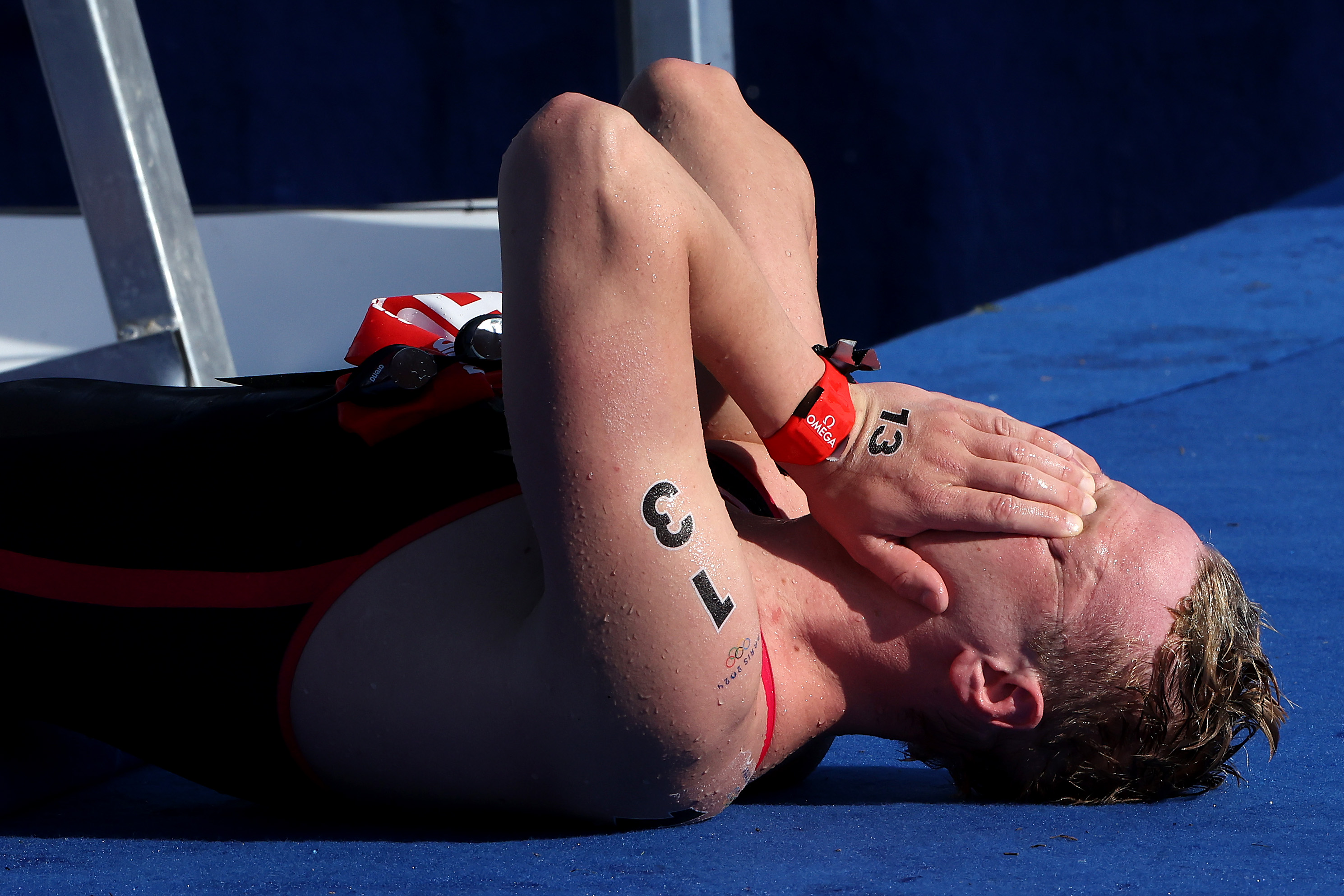
Jan Hercog reacts after competing in the Marathon Swimming Men's 10k at the Olympic Games in Paris, France, on August 9, 2024 | Source: Getty Images
Auboeck acknowledged that anyone claiming they weren't concerned about the conditions was likely not being truthful. He noted, "Of course, you're concerned because no one wants to get ill."
The swimmer also shared, "I am concerned. I just hope and trust the organization in the sense that they will let us in only when it's safe enough to do so."
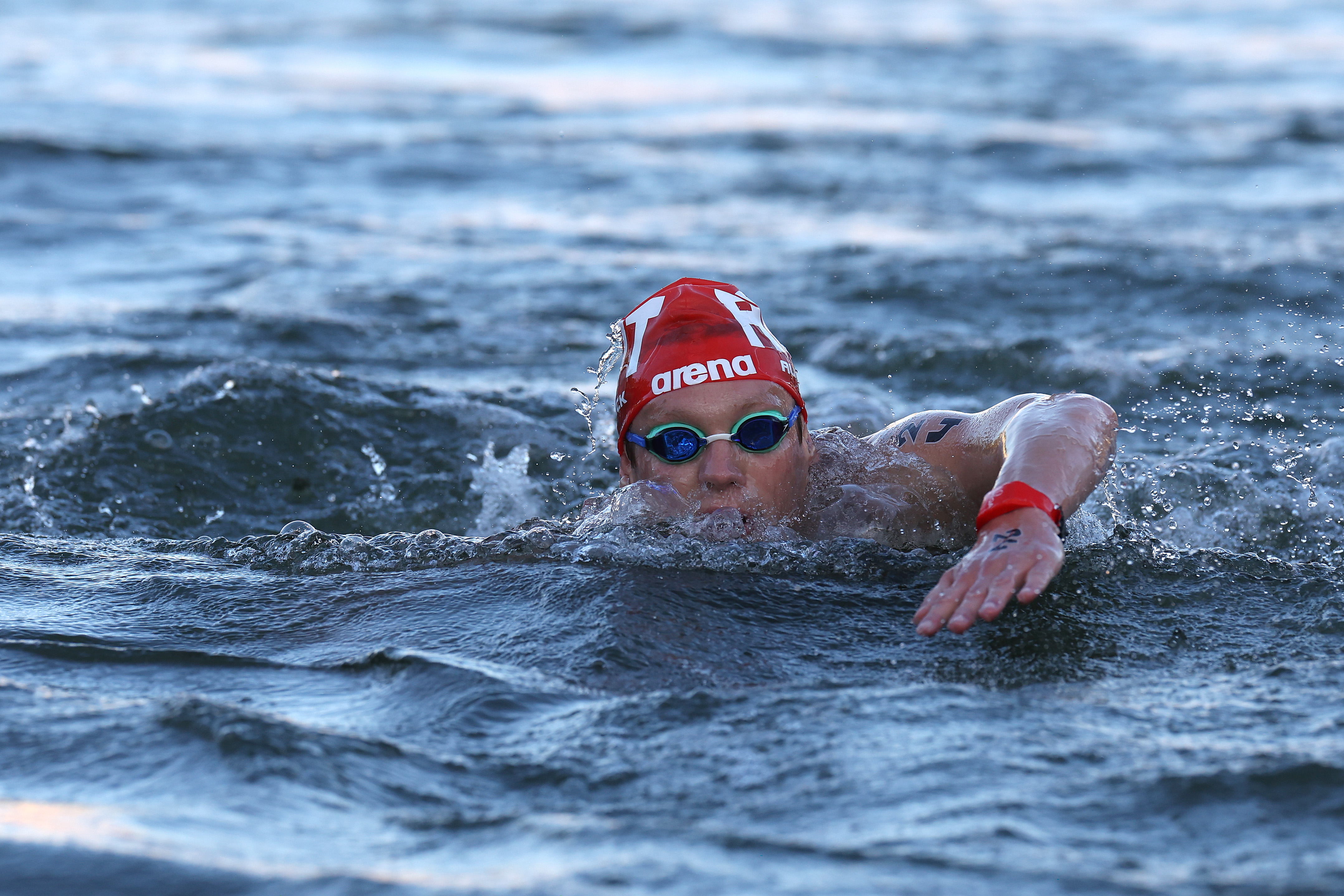
Felix Aubock competes in the Marathon Swimming Men's 10k event at the Olympic Games in Paris, France, on August 9, 2024 | Source: Getty Images
French Authorities Comment on River's Role in Illnesses
French authorities have maintained that there was no direct evidence linking the Seine River to the recent illnesses among athletes. They emphasized that their immediate reports show there is no clear connection between the river's water quality and the health issues reported.
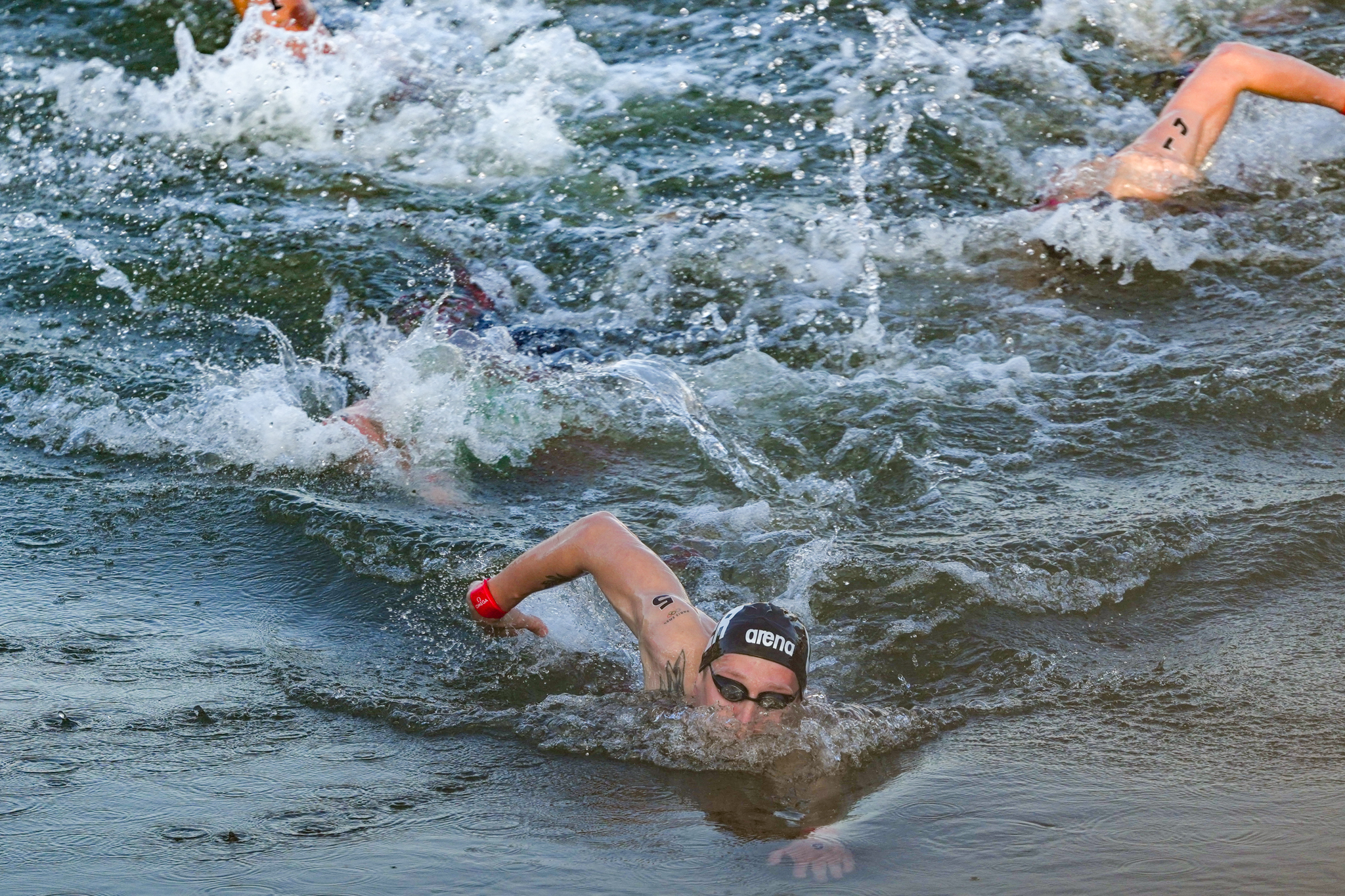
Florian Wellbrock competing in the Marathon Swimming Men's 10km event at the Olympic Games in Paris, France, on August 9, 2024 | Source: Getty Images
Despite reassurances and rigorous testing, questions about whether it was safe to swim in the Seine persist. People have noted that while significant efforts were made to clean the Seine River before the Paris 2024 Olympics, the illnesses athletes experienced should raise concern about the water quality.
The information in this article is not intended or implied to be a substitute for professional medical advice, diagnosis or treatment. All content, including text, and images contained on news.AmoMama.com, or available through news.AmoMama.com is for general information purposes only. news.AmoMama.com does not take responsibility for any action taken as a result of reading this article. Before undertaking any course of treatment please consult with your healthcare provider.
